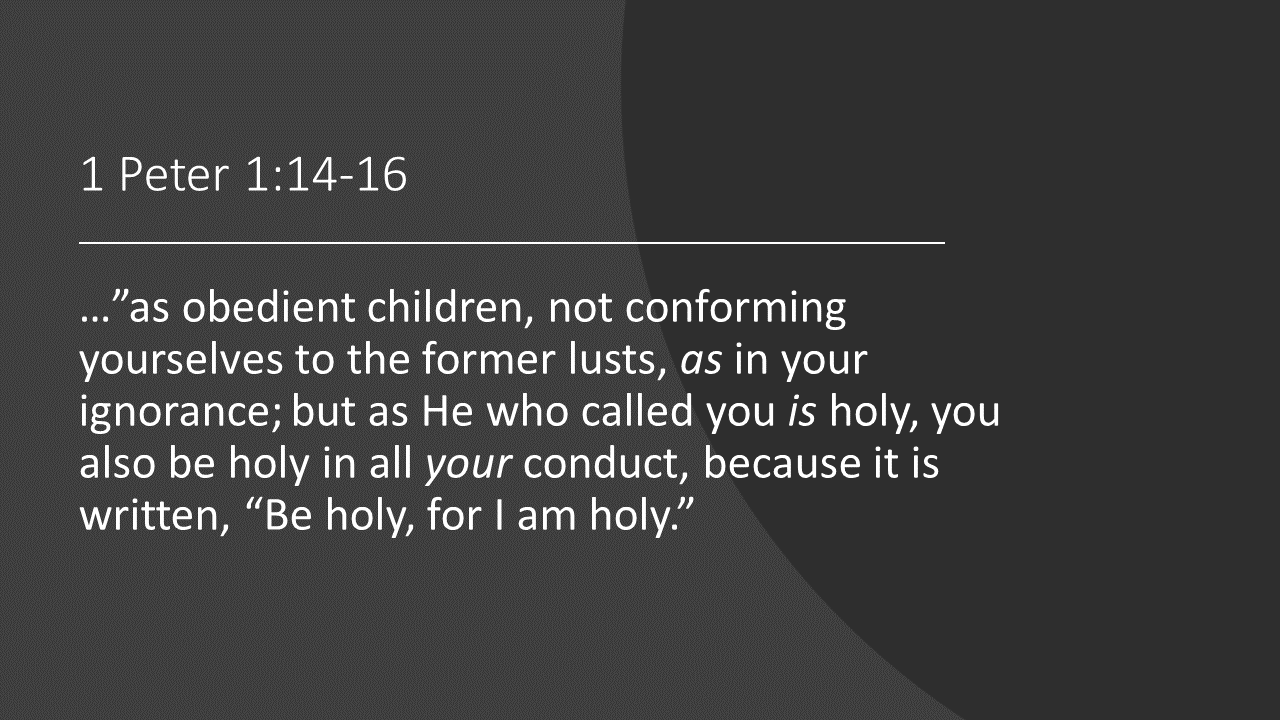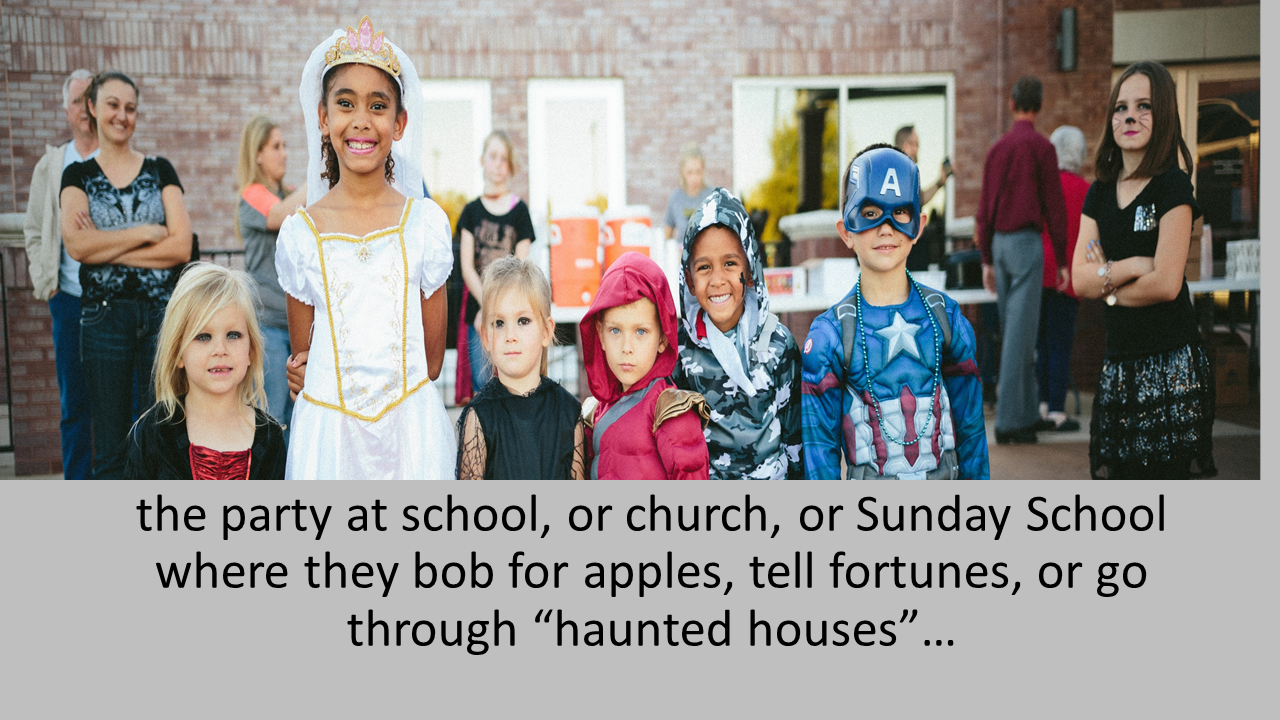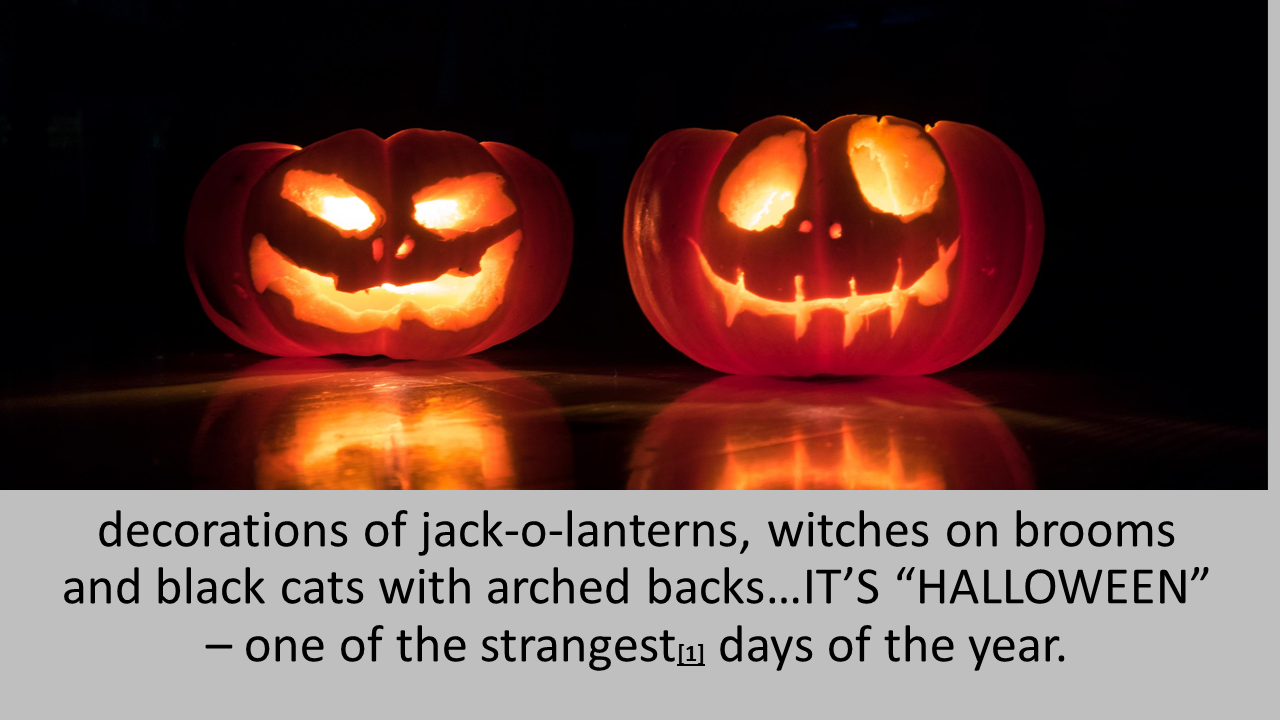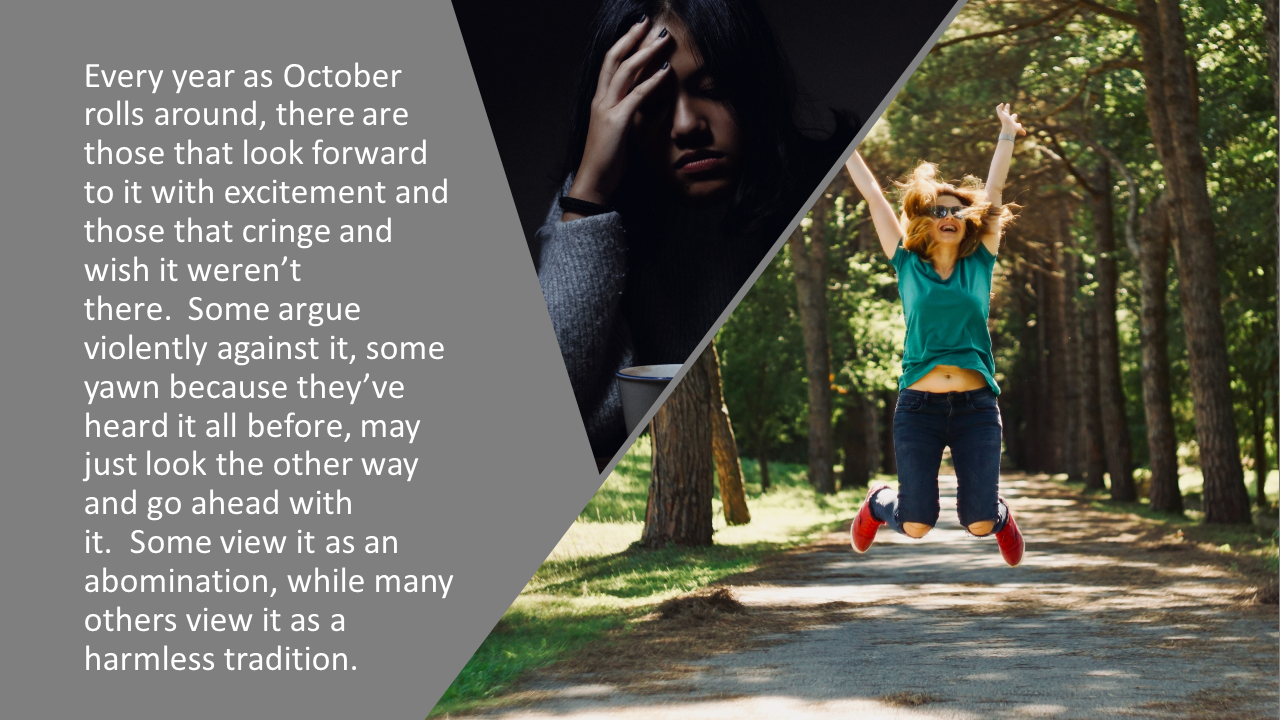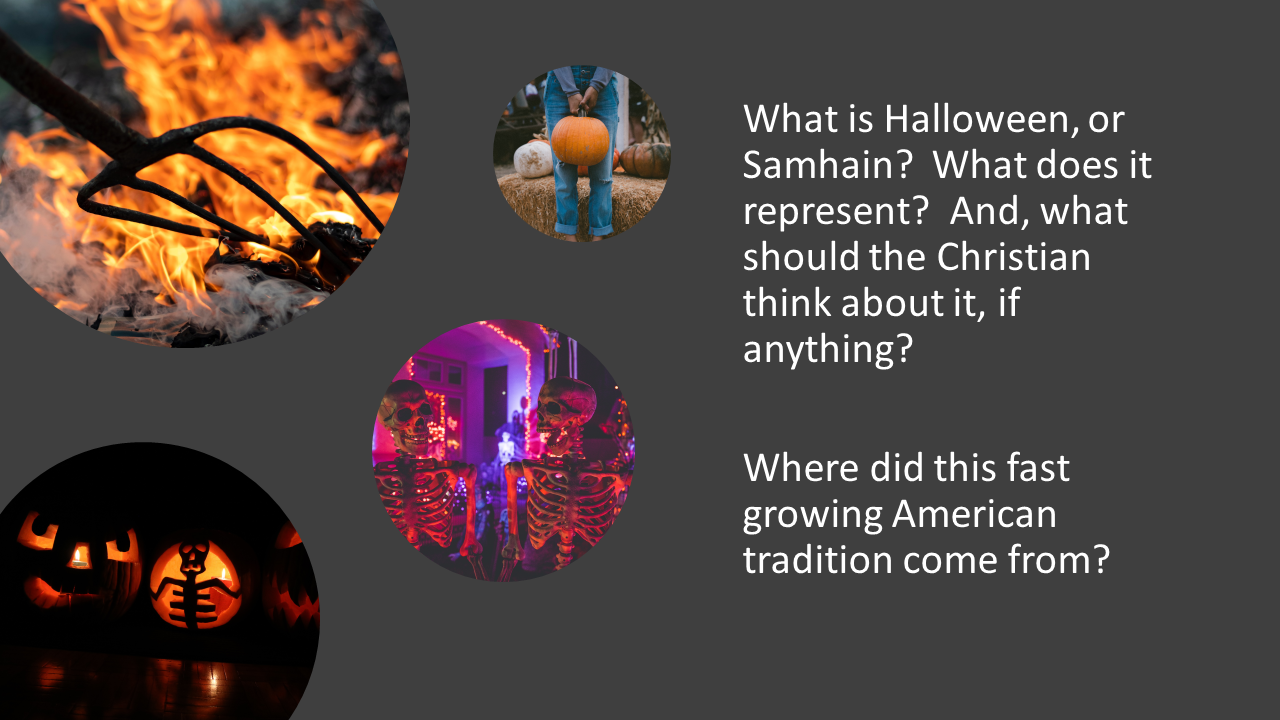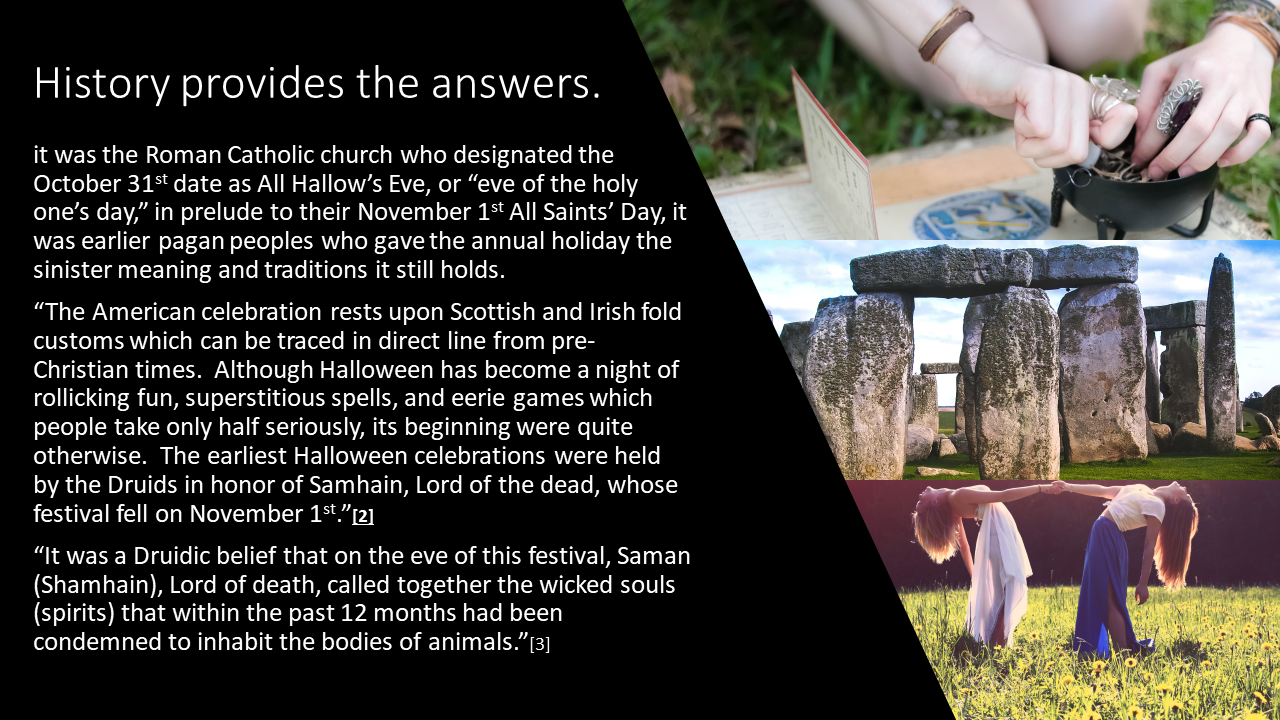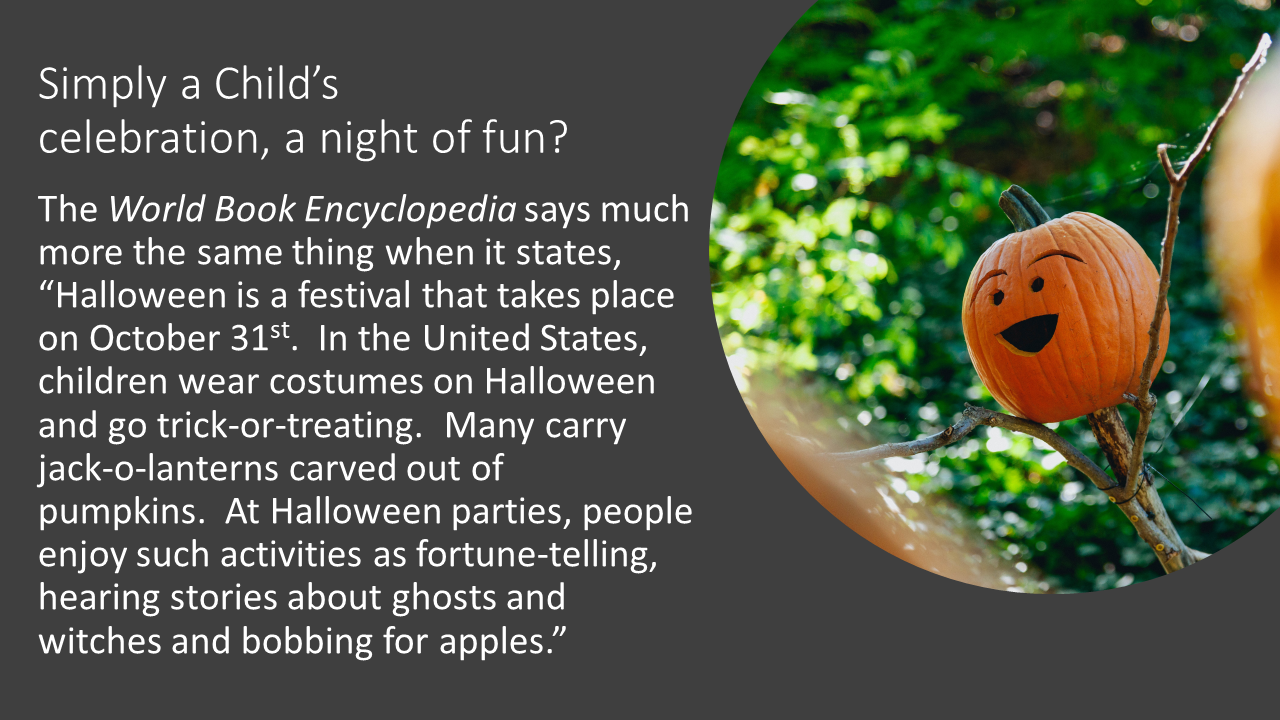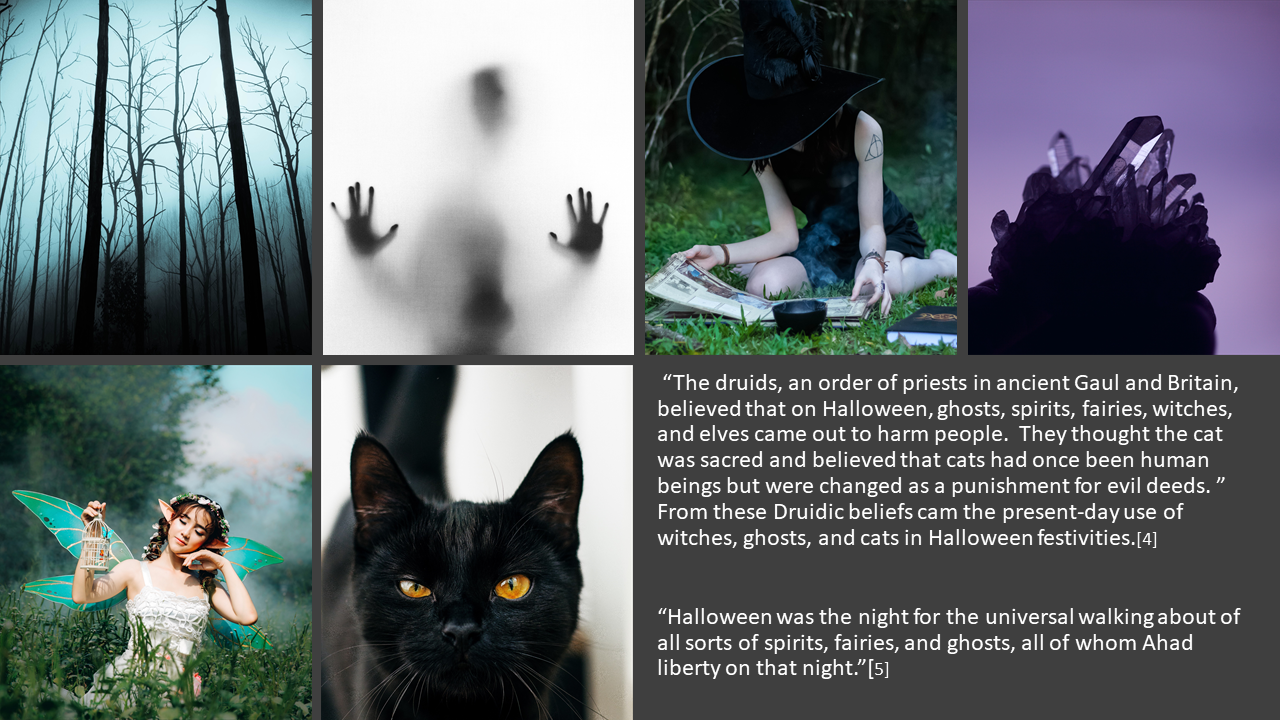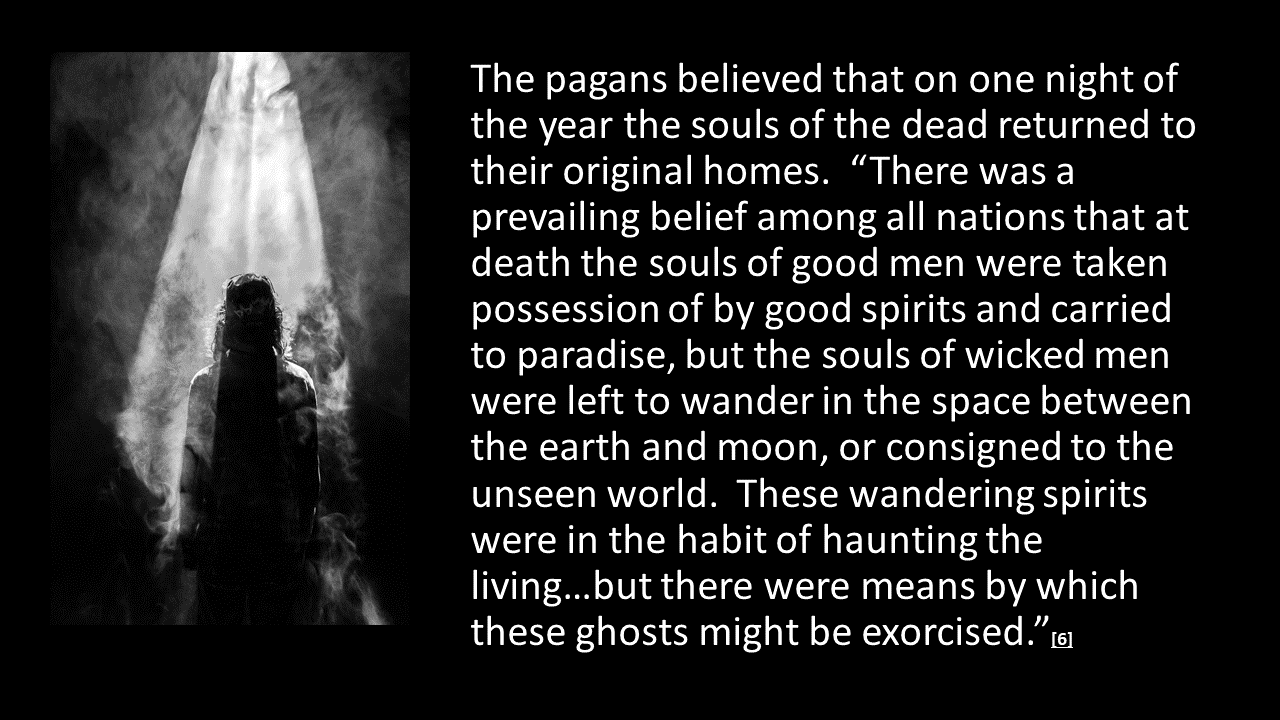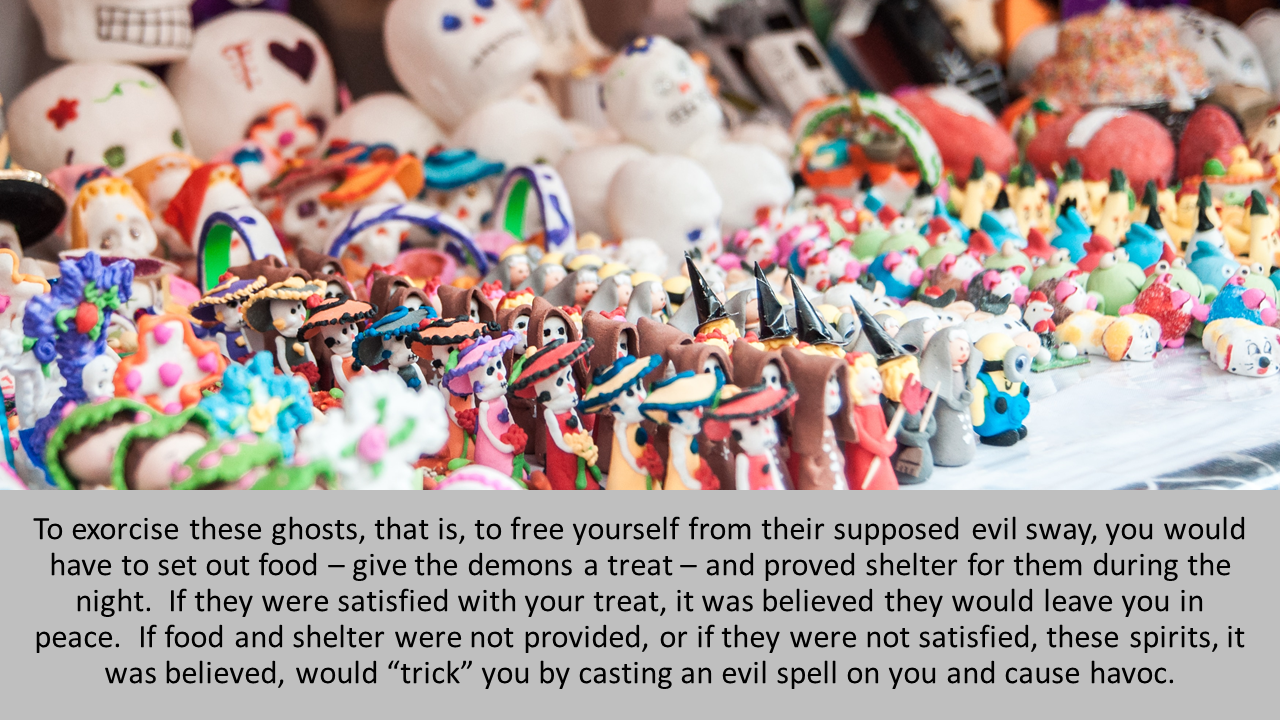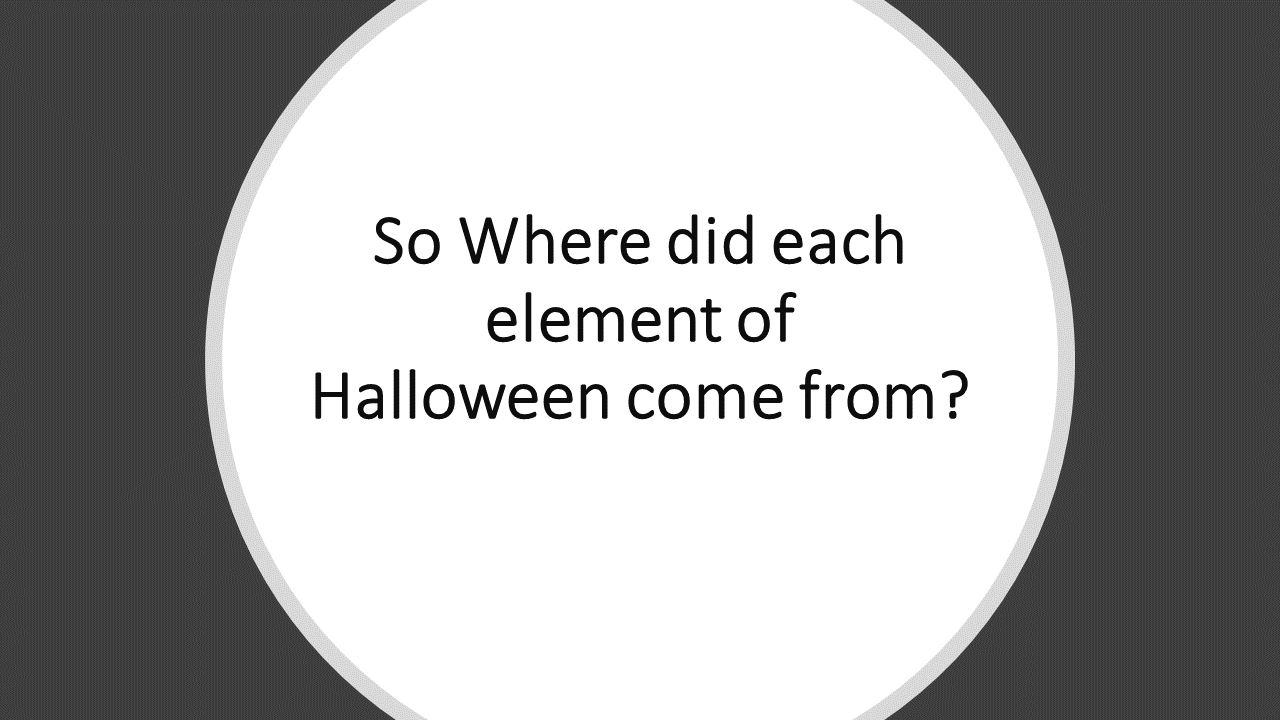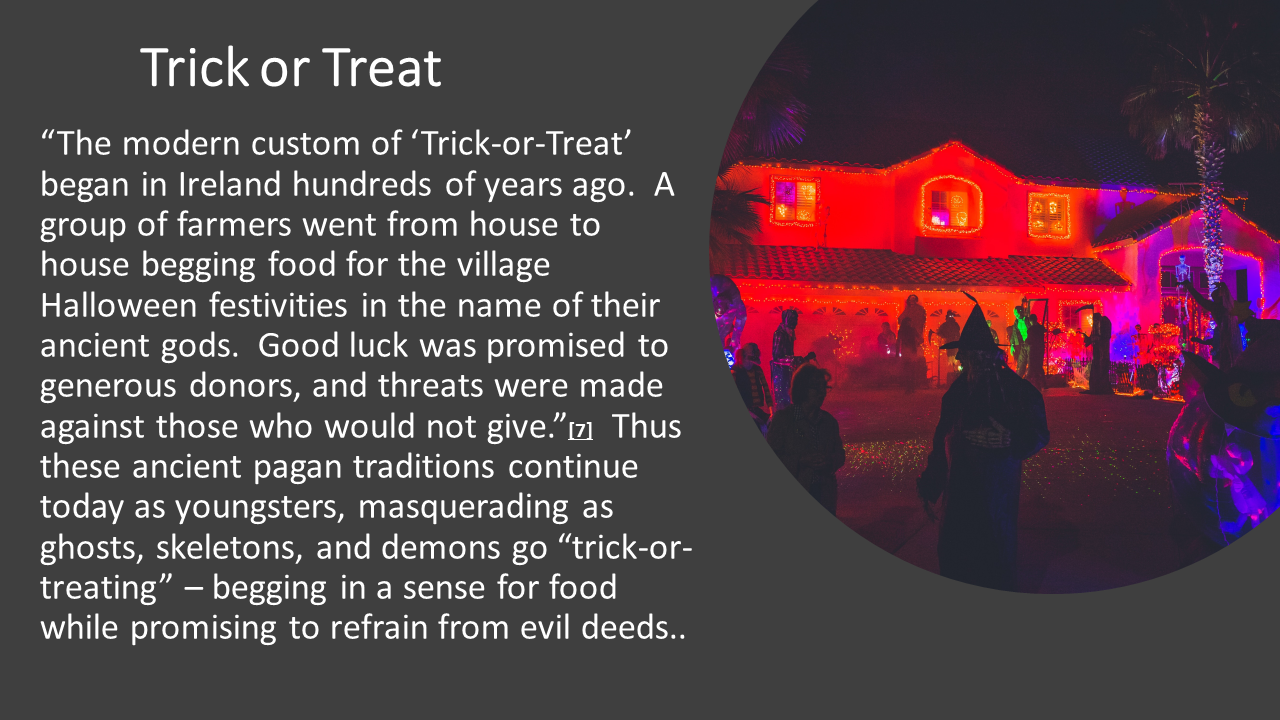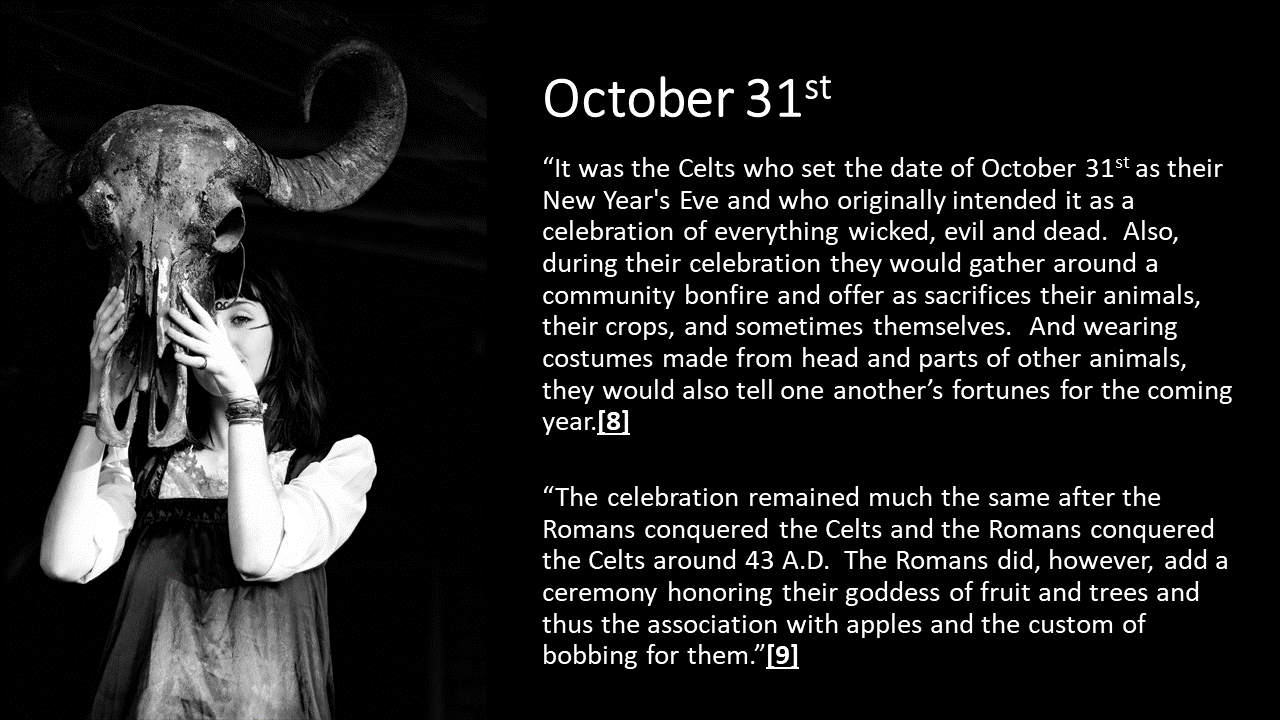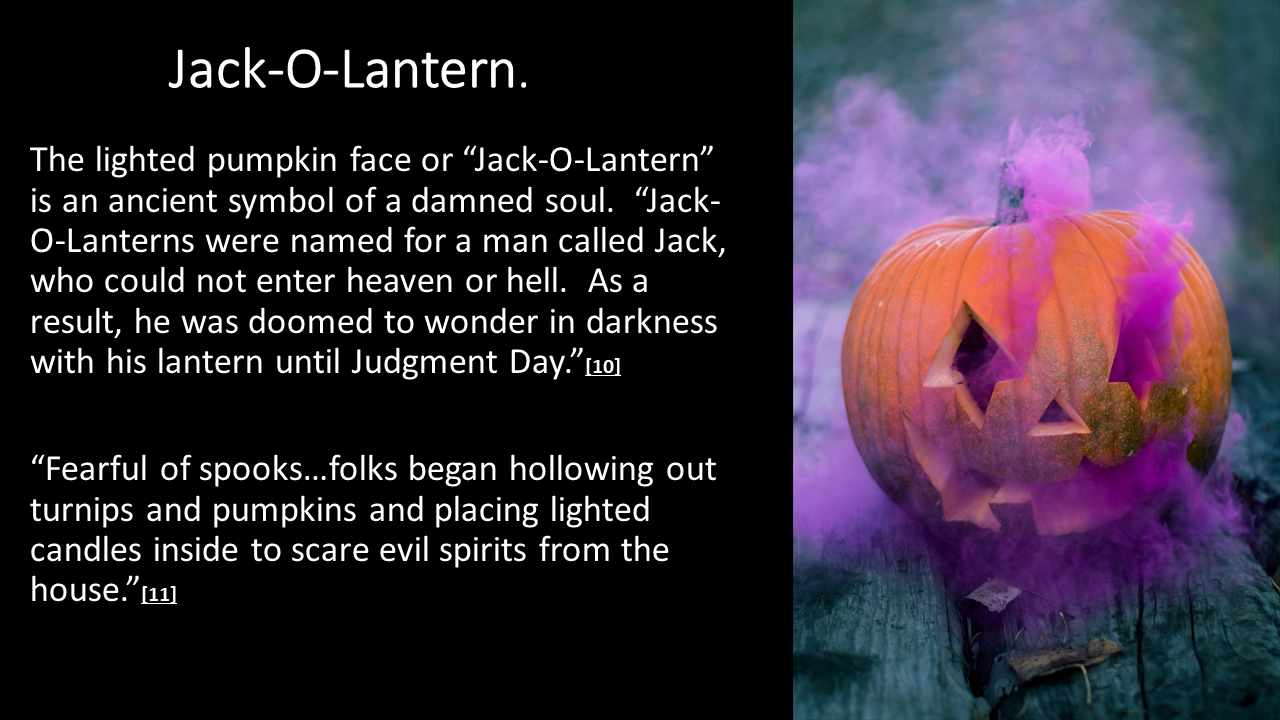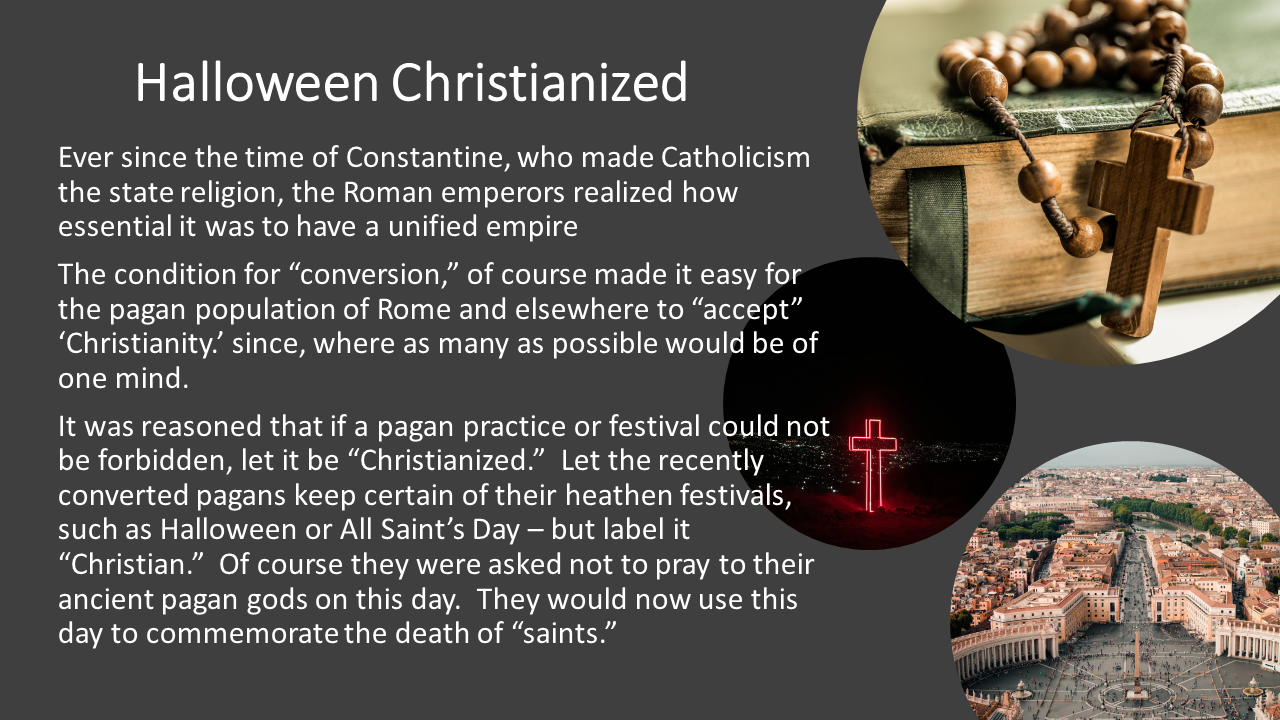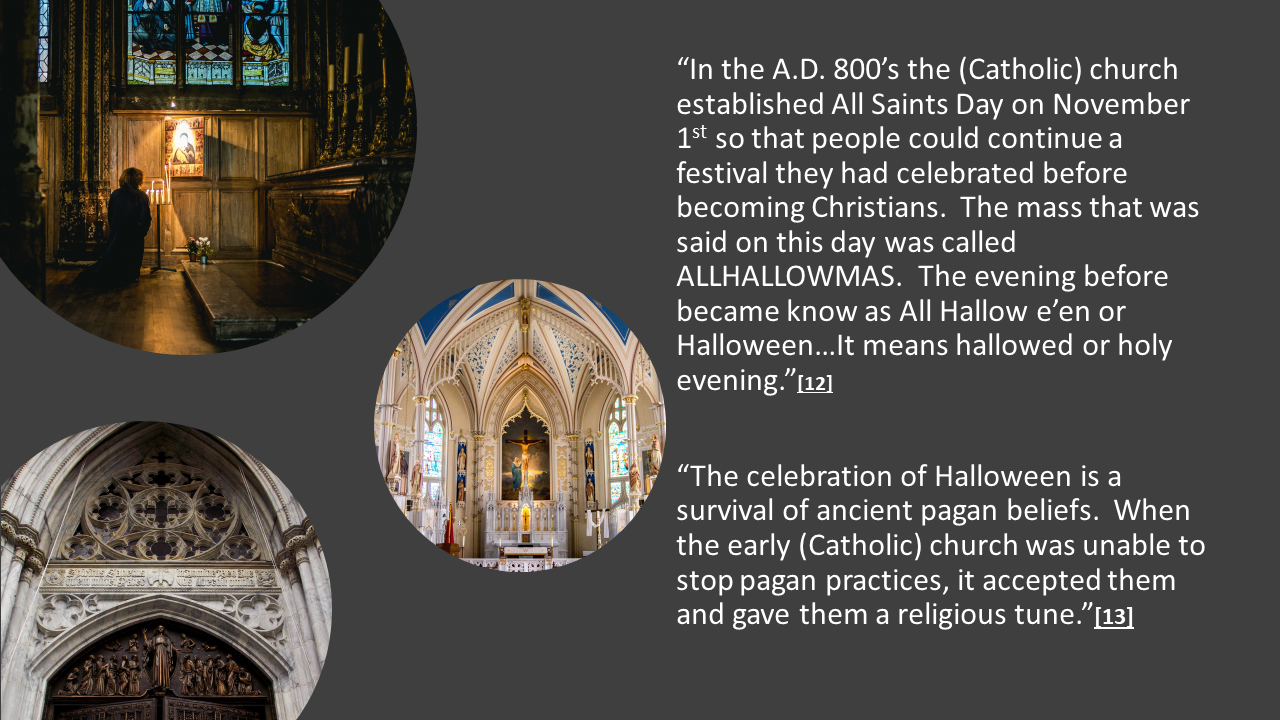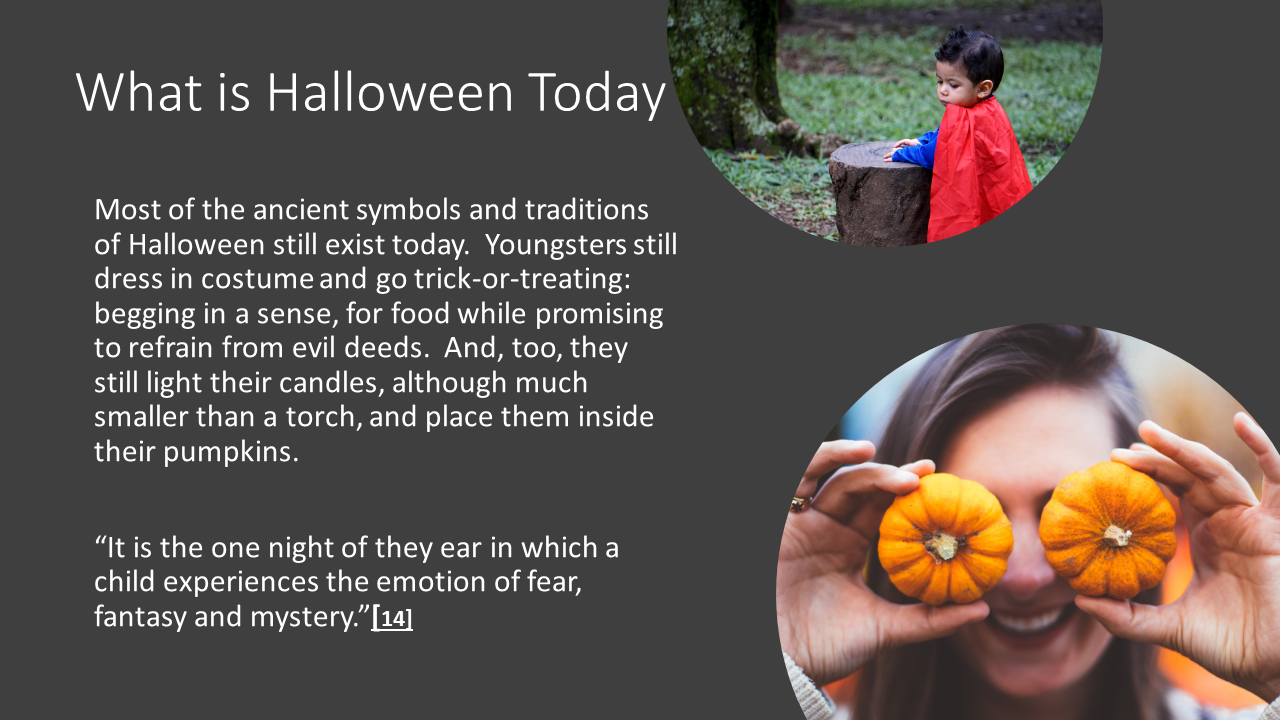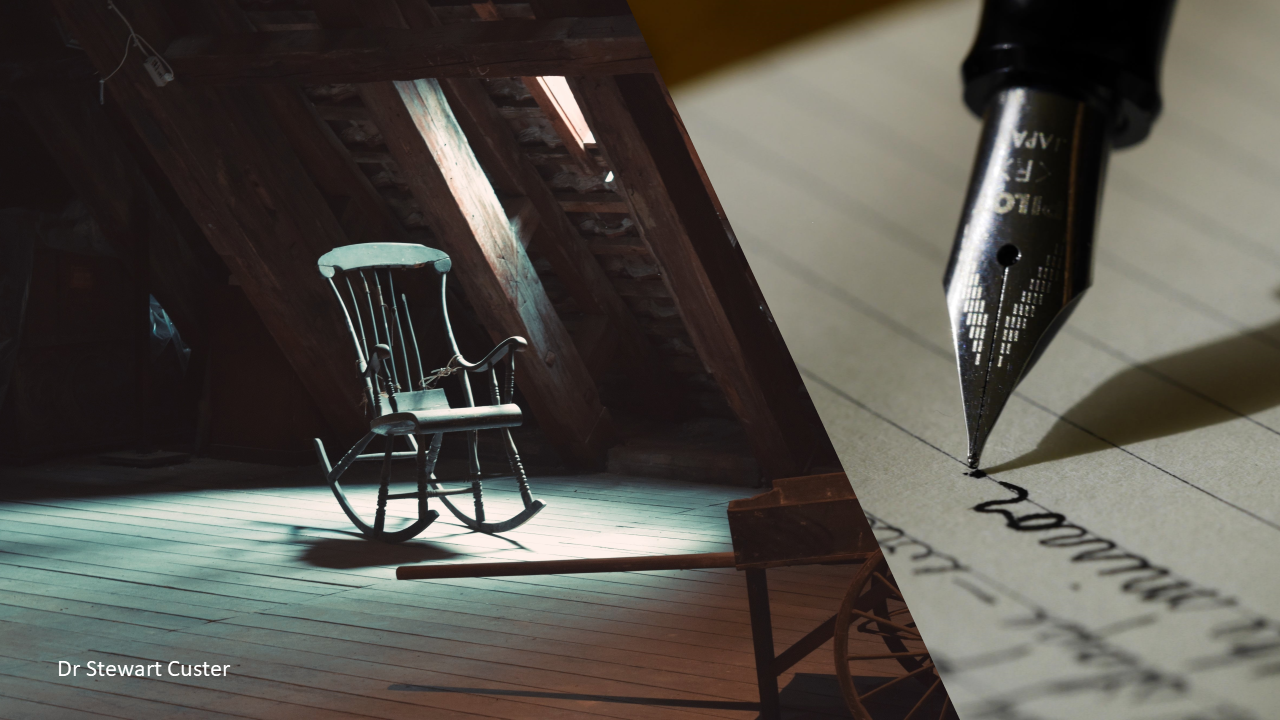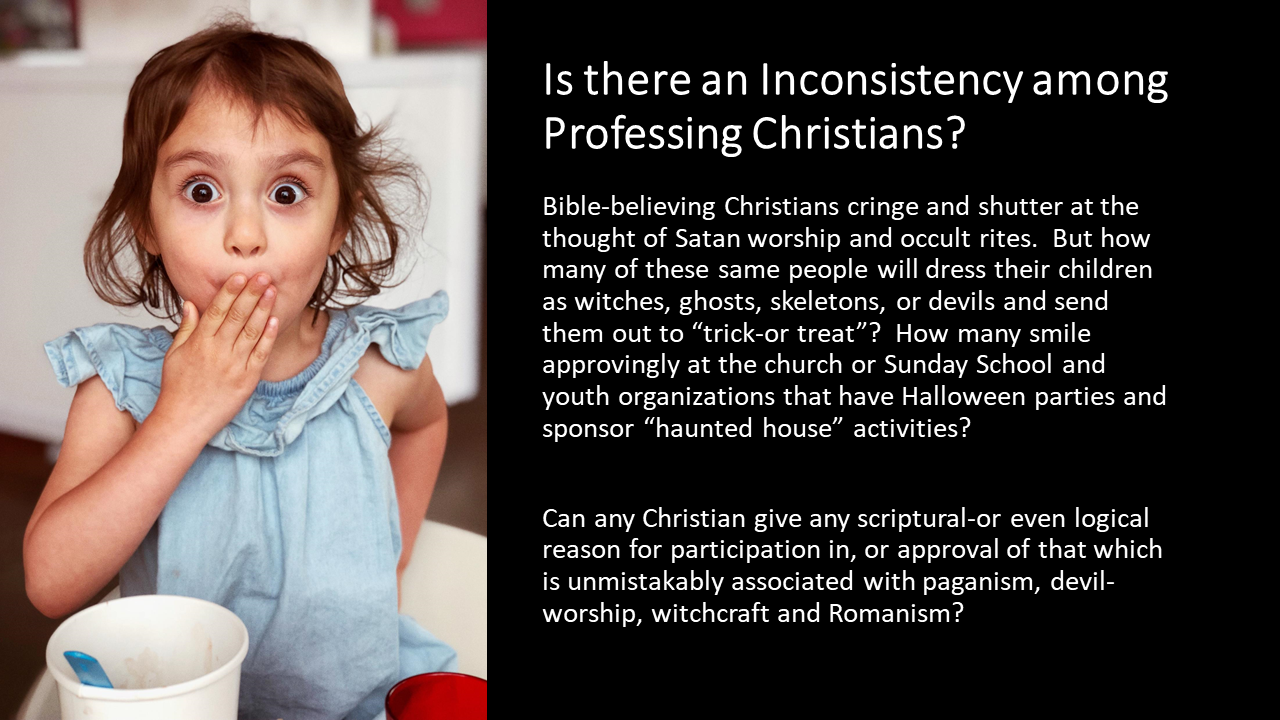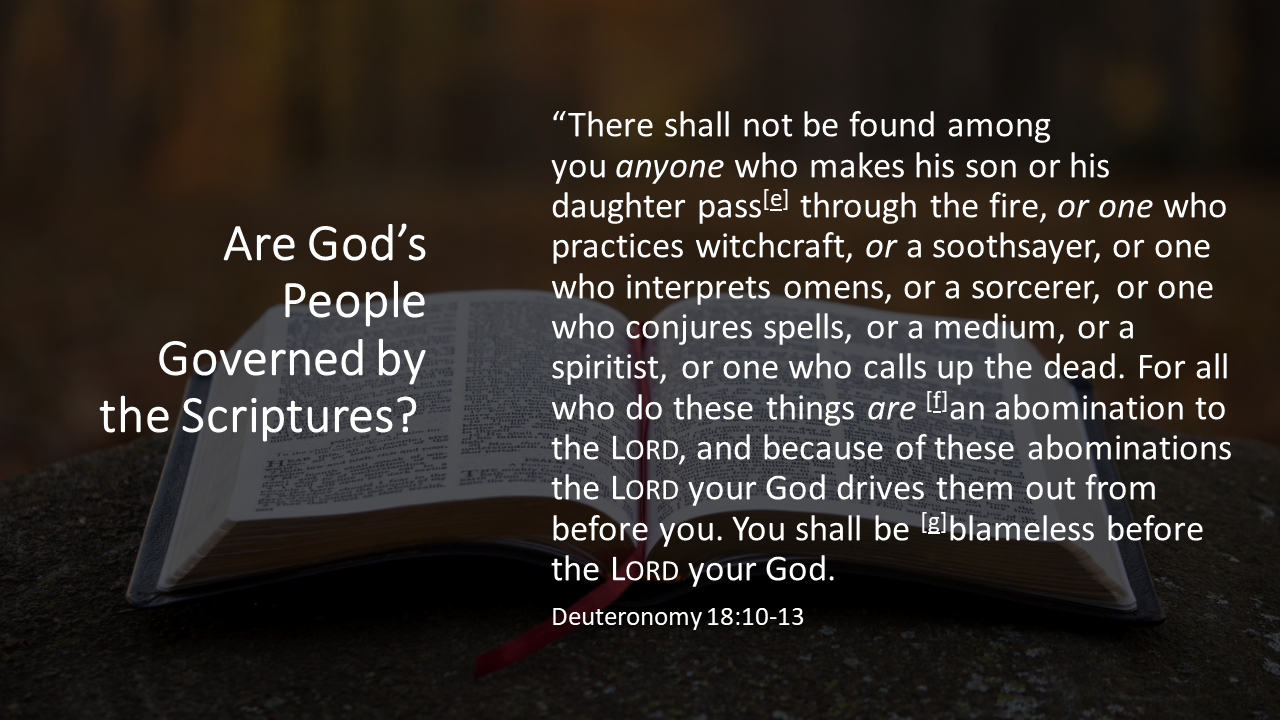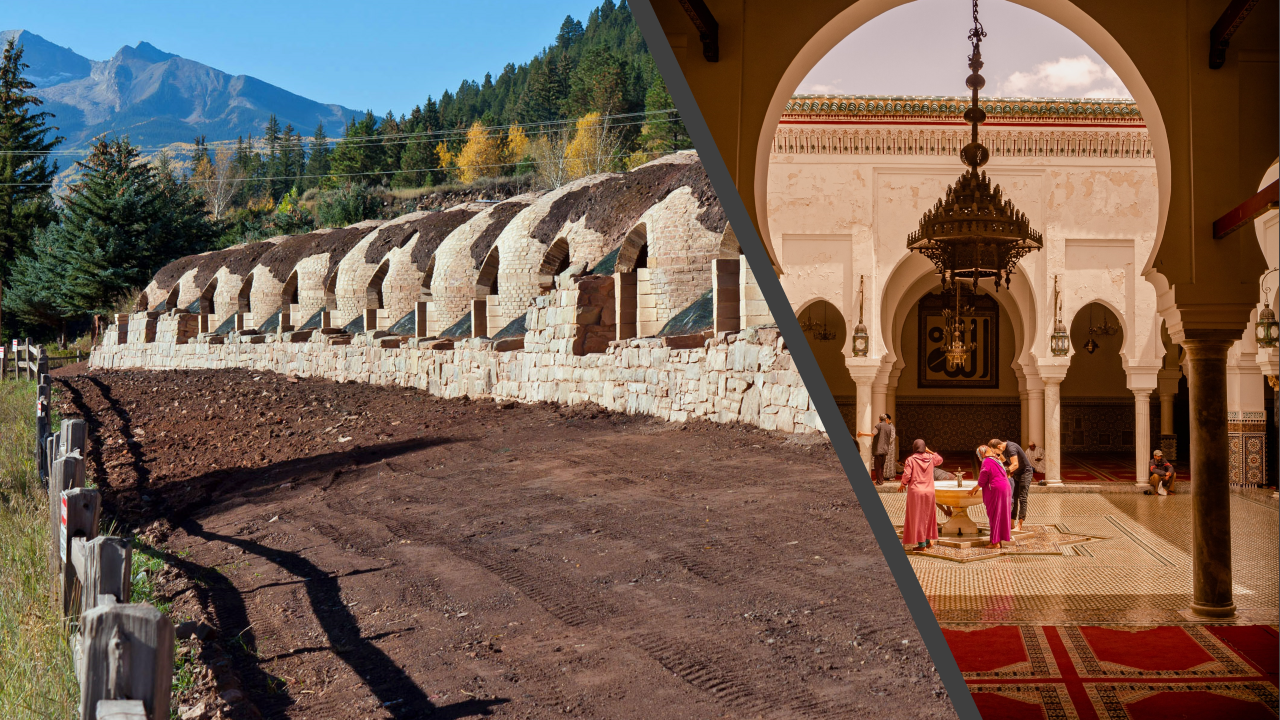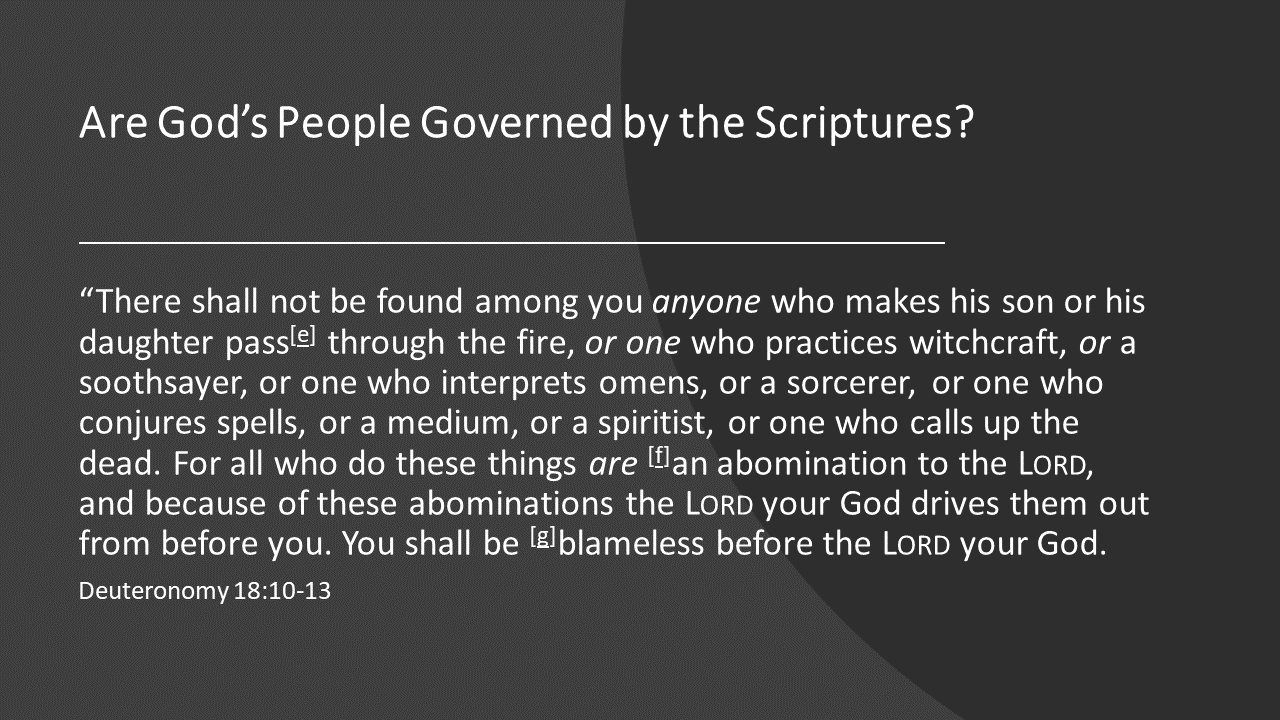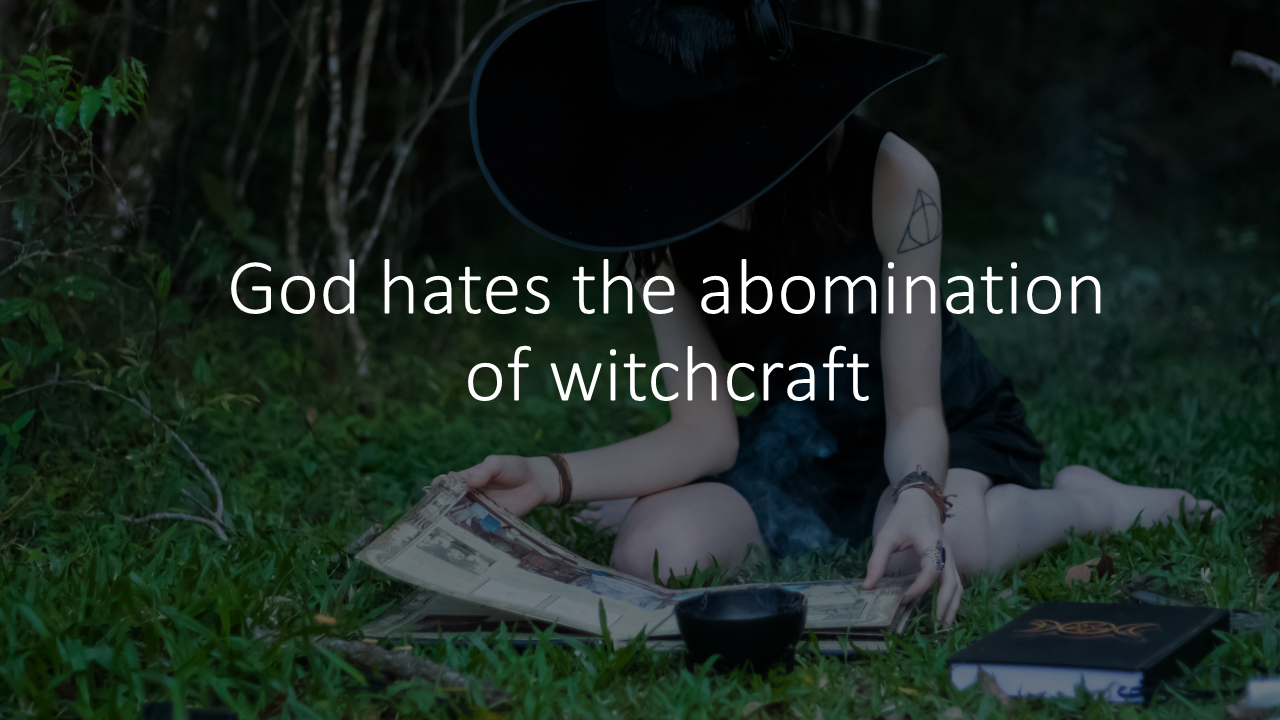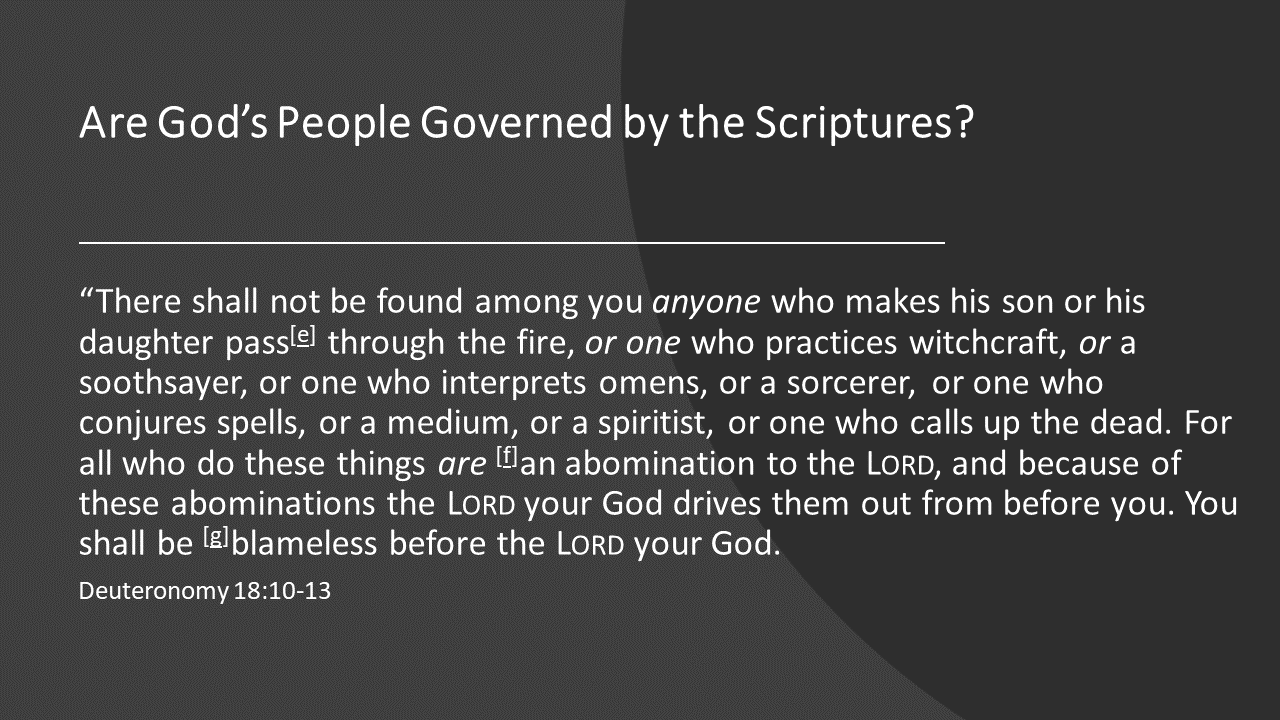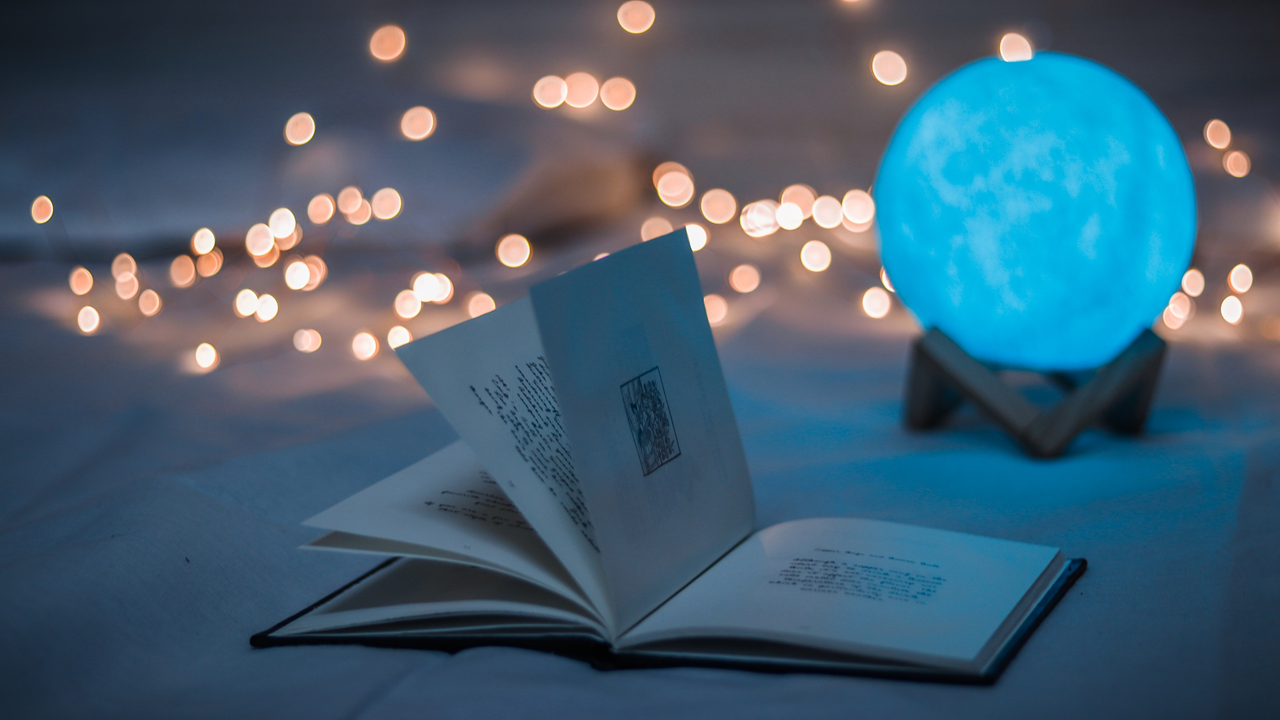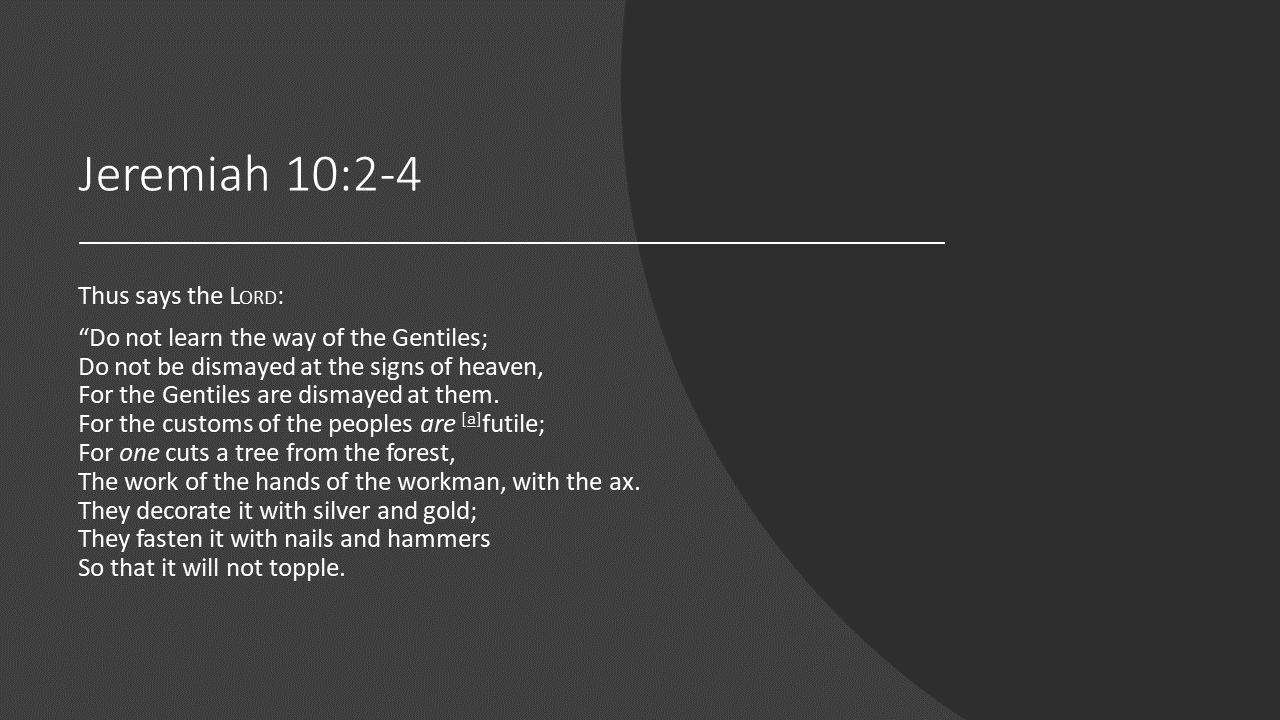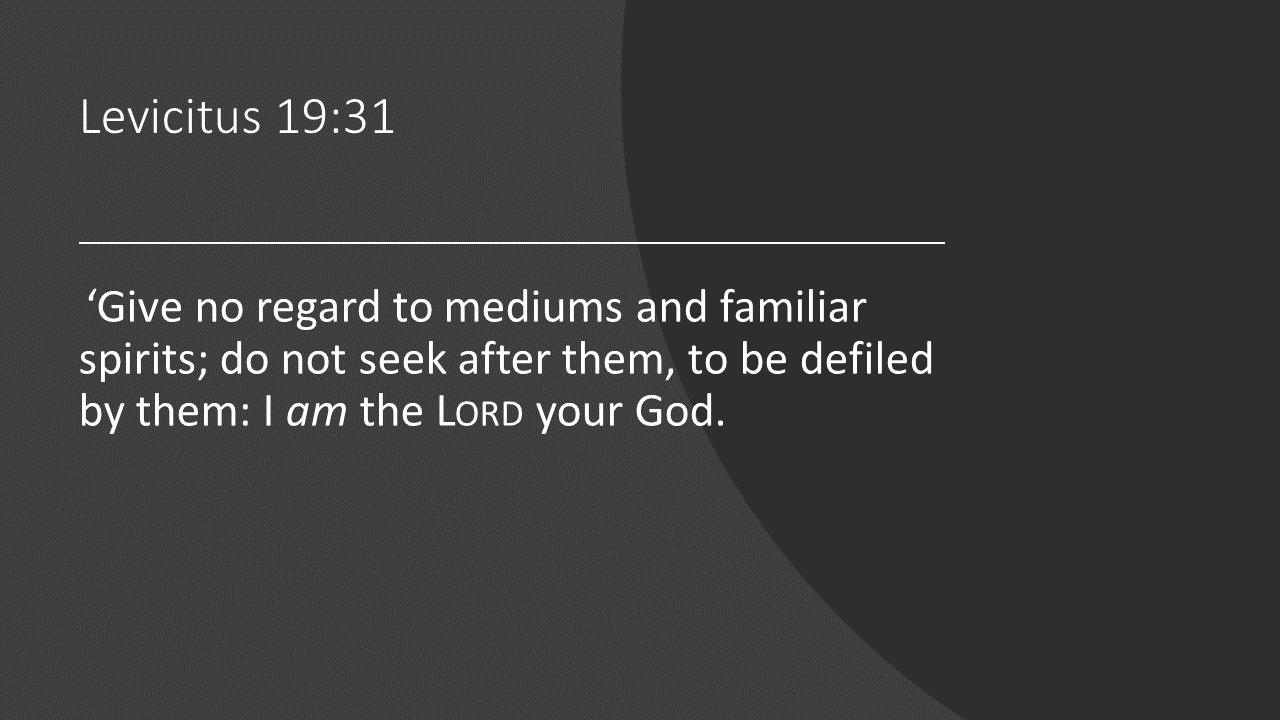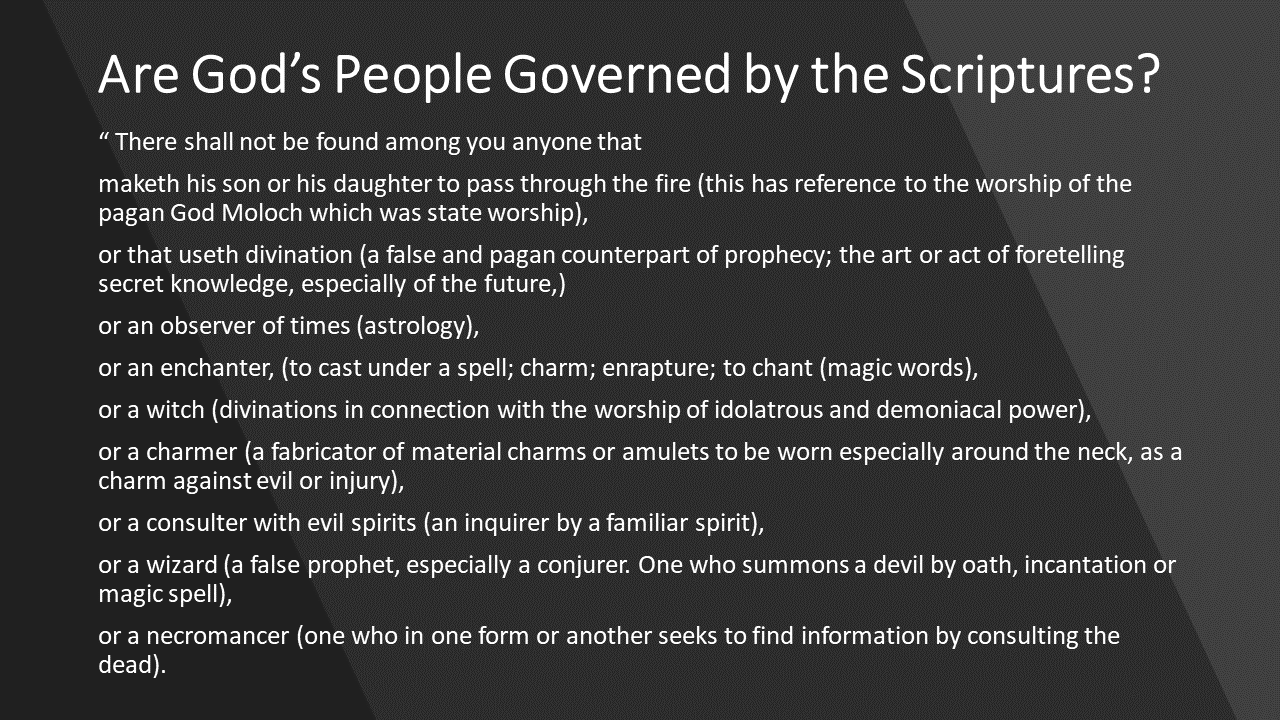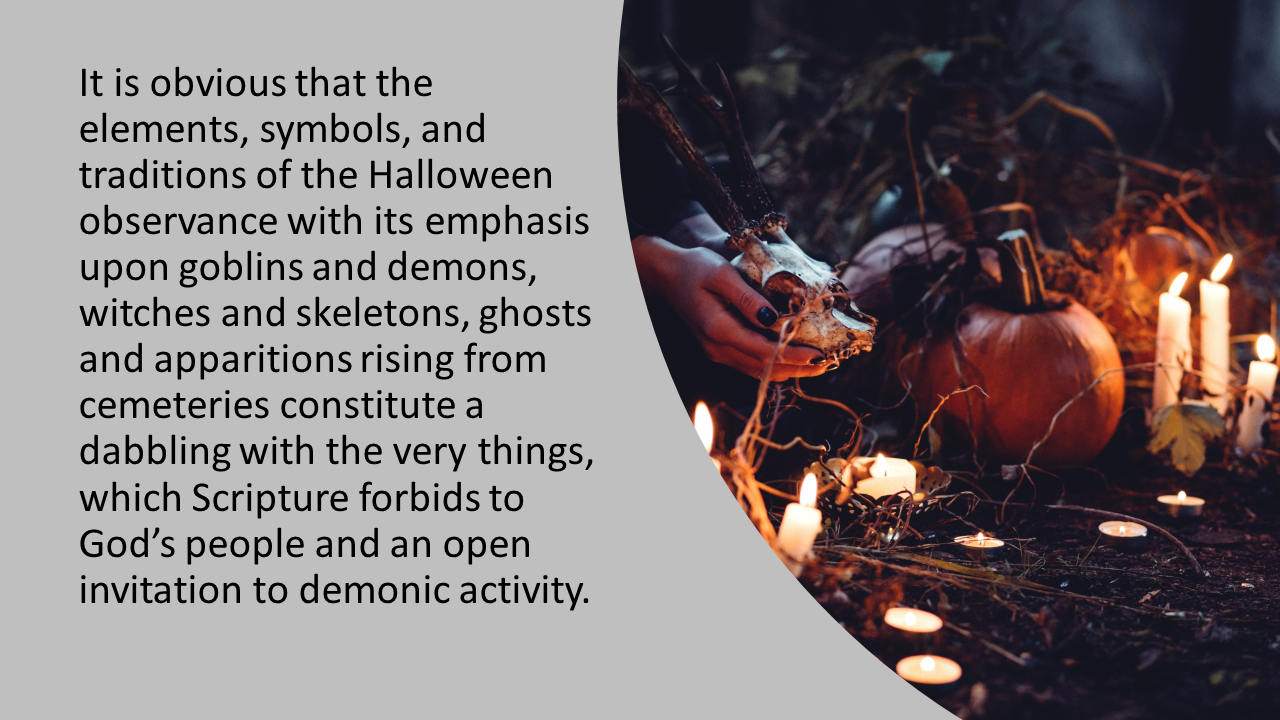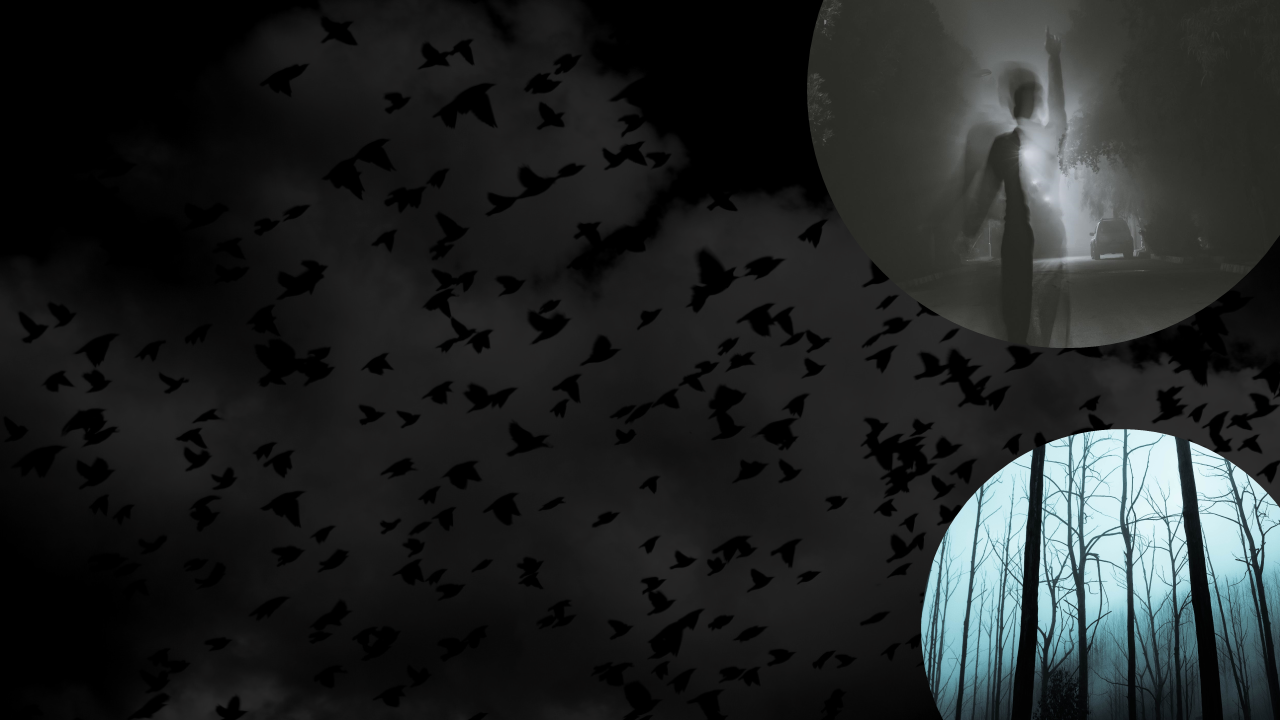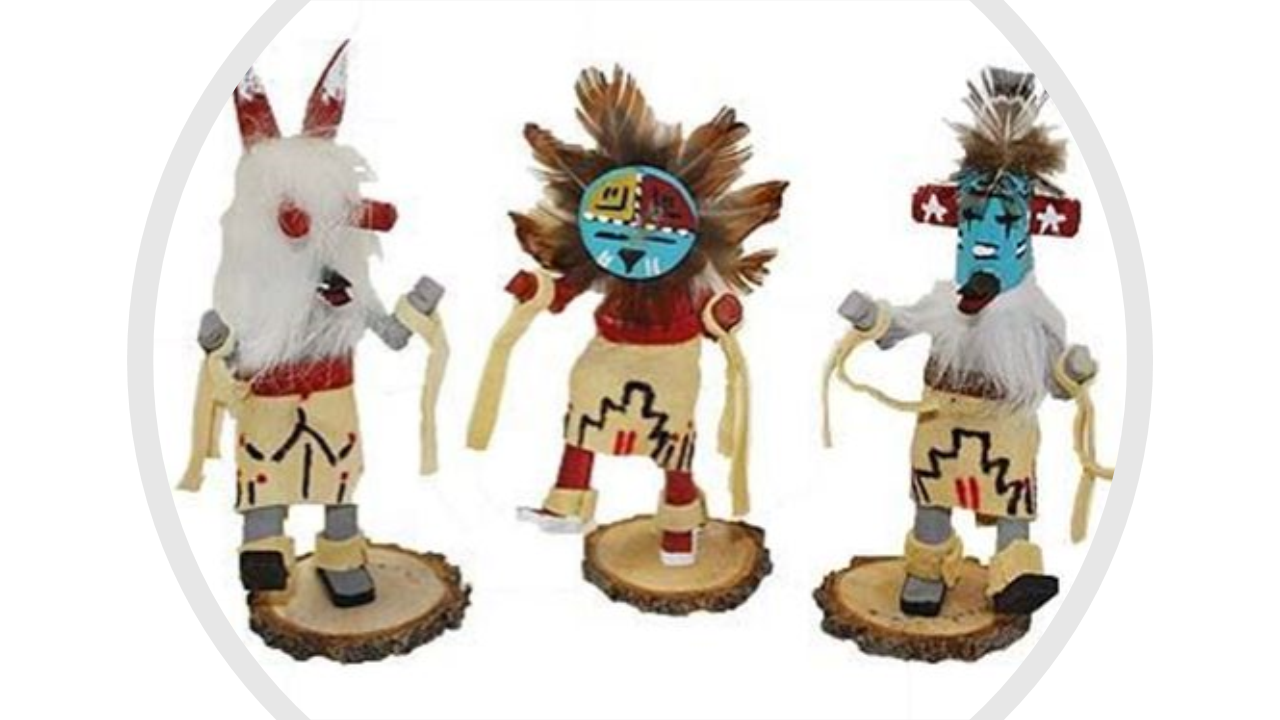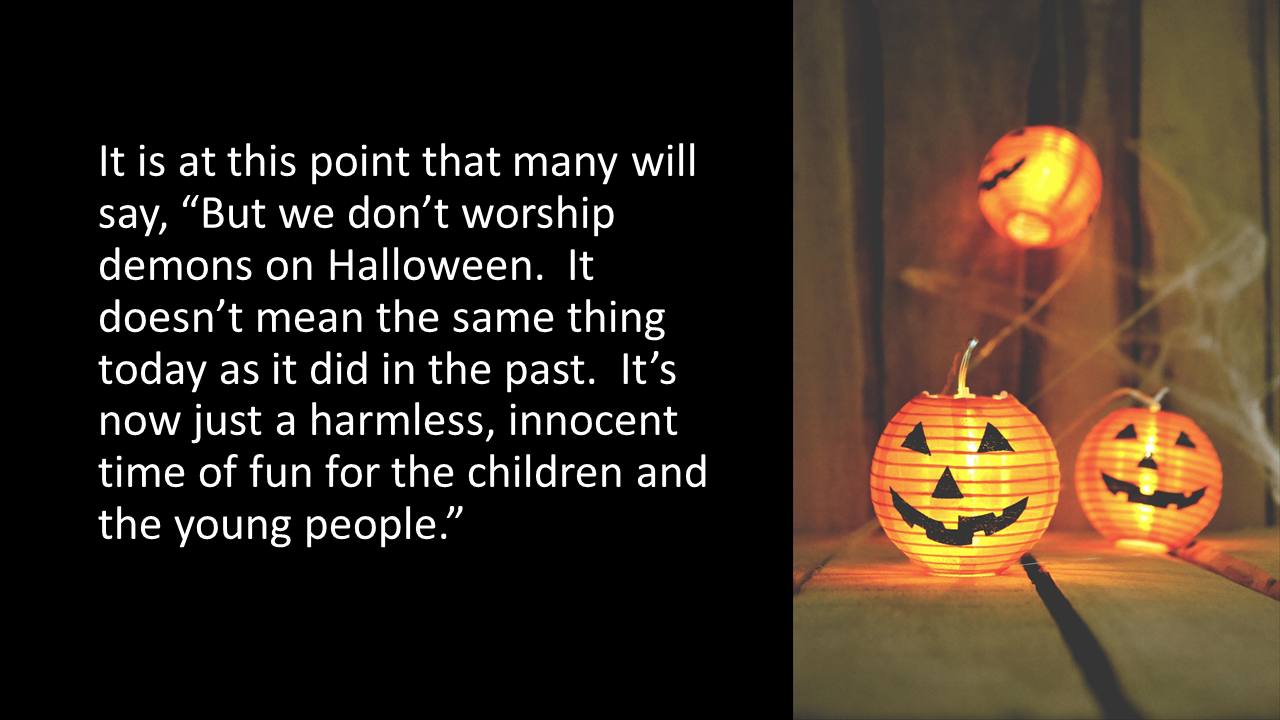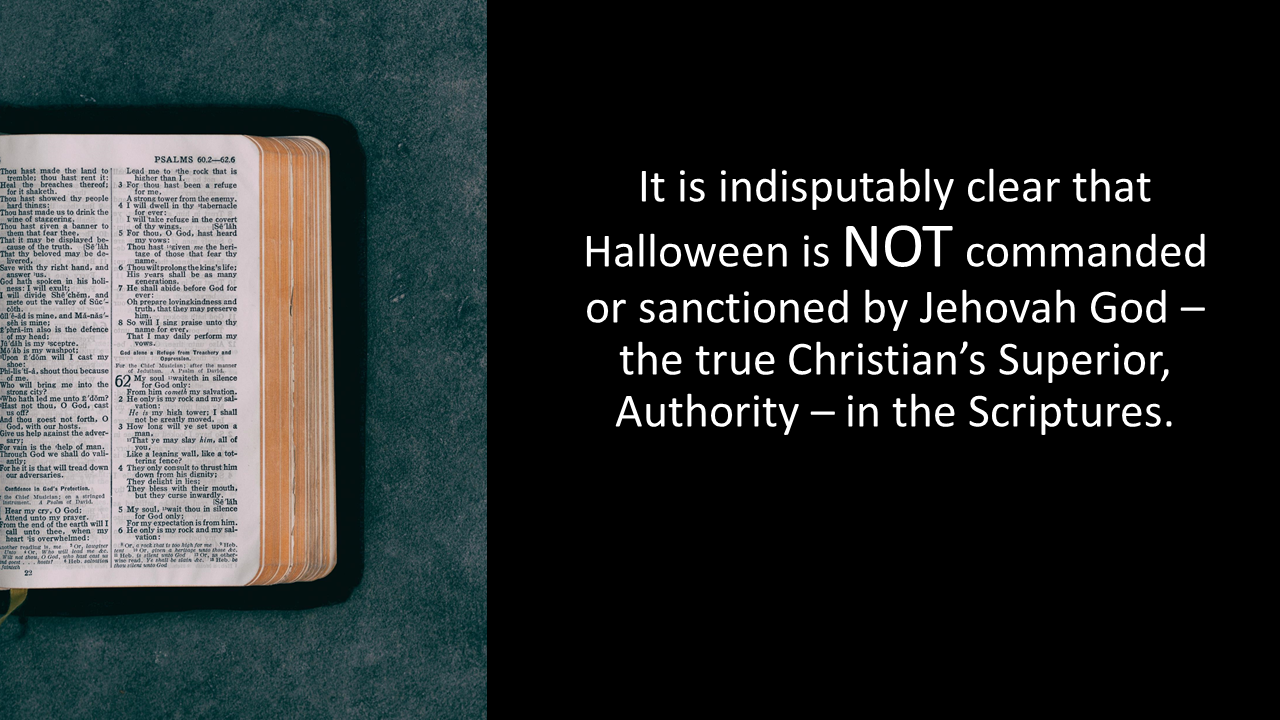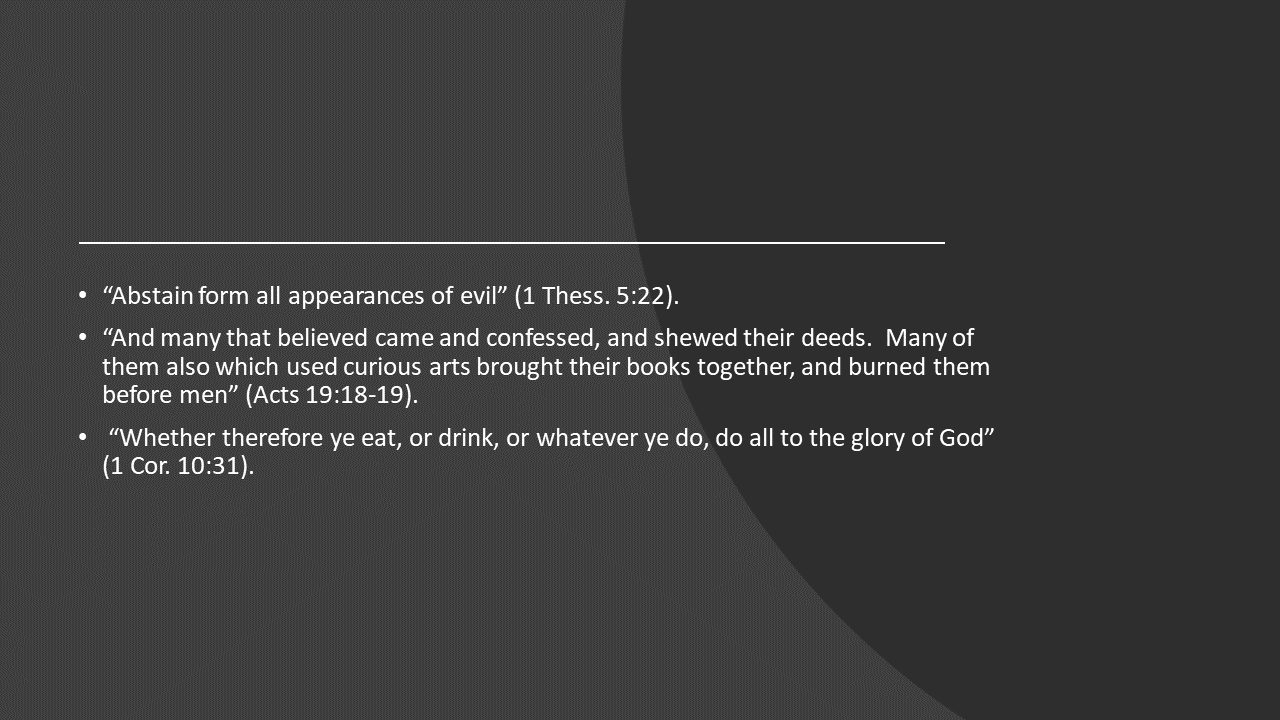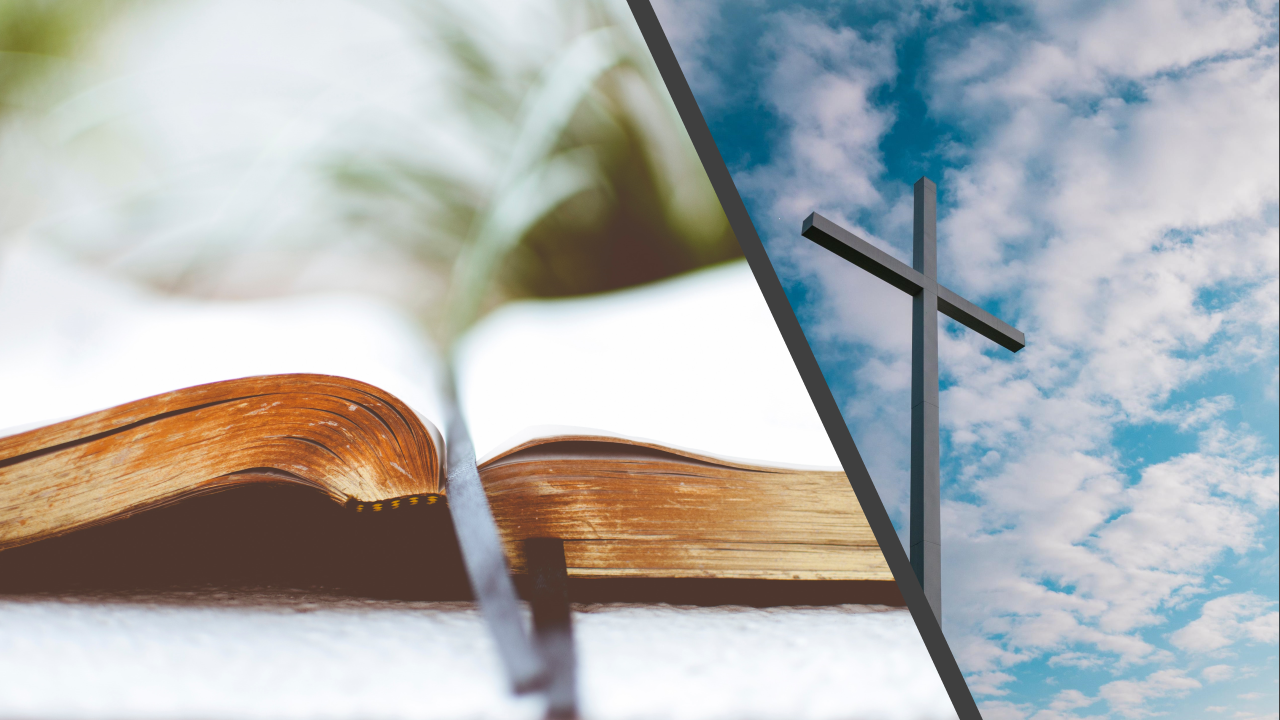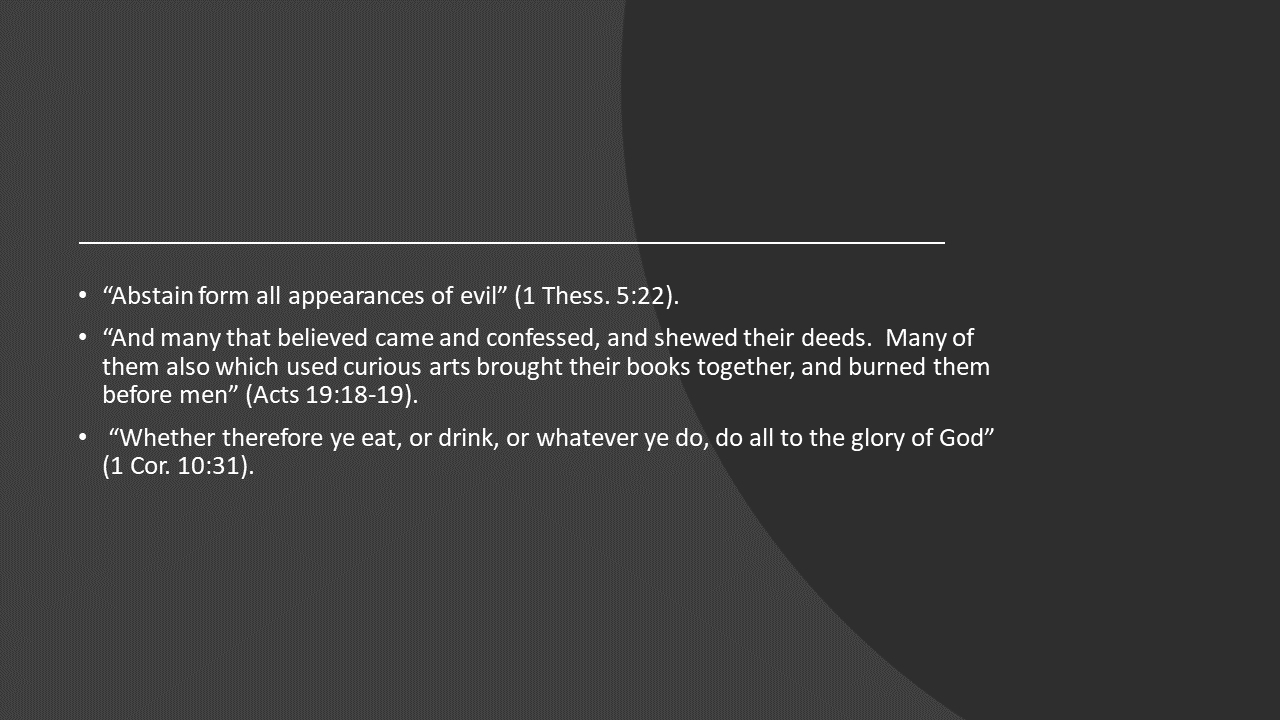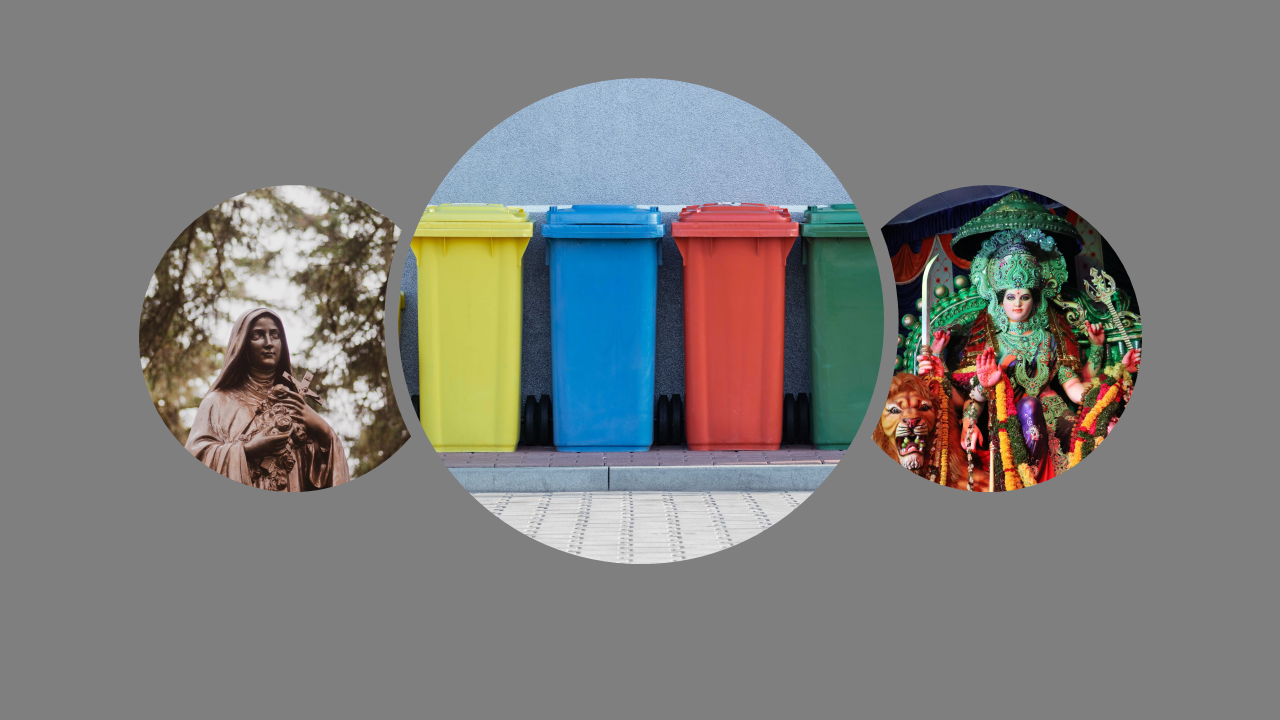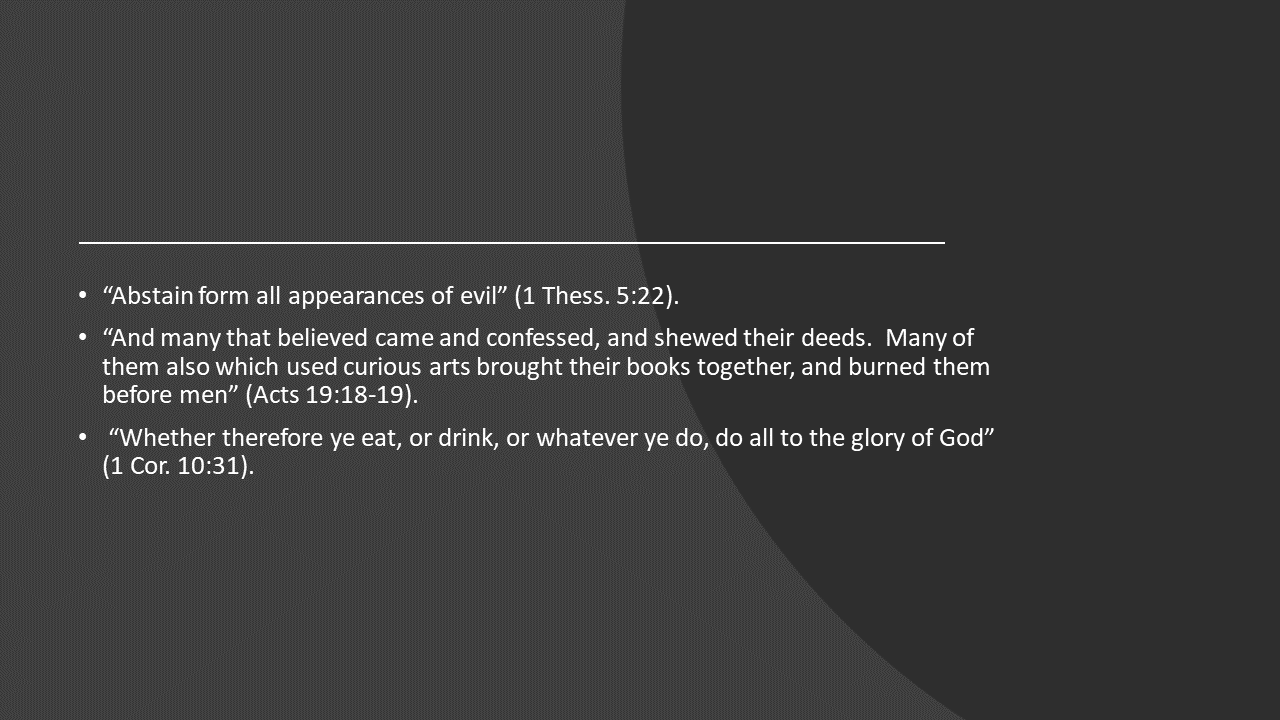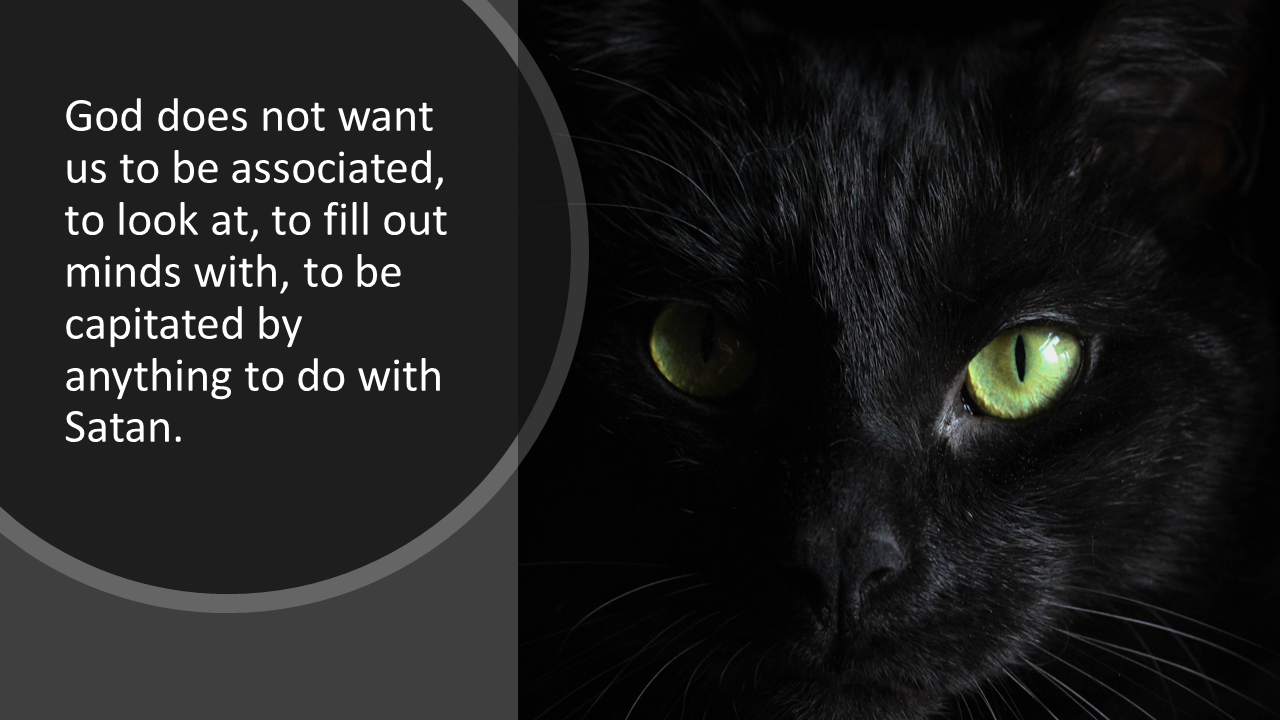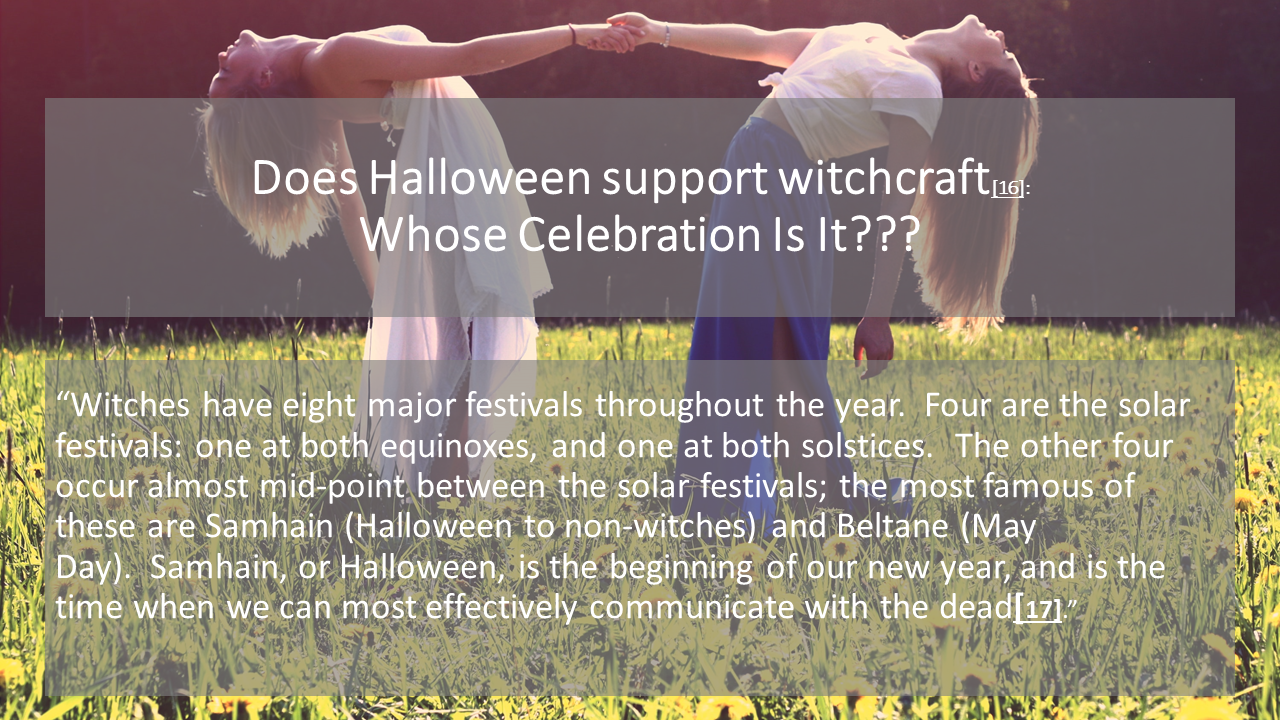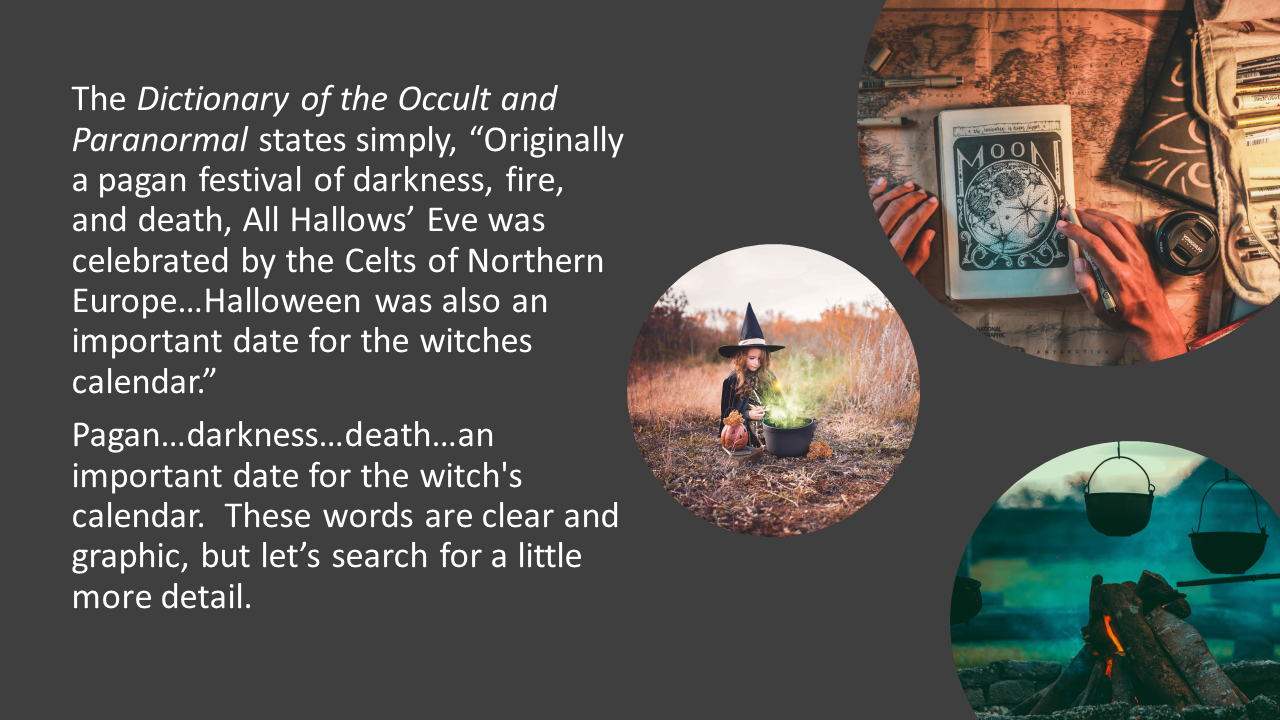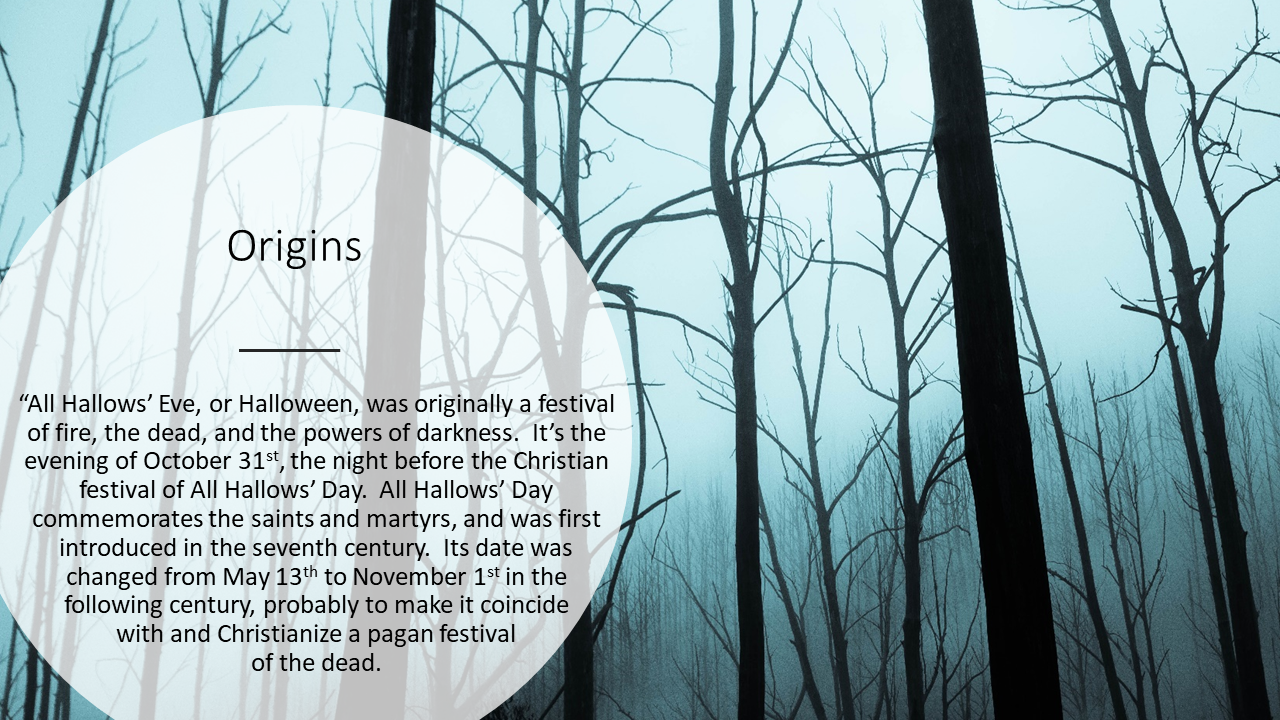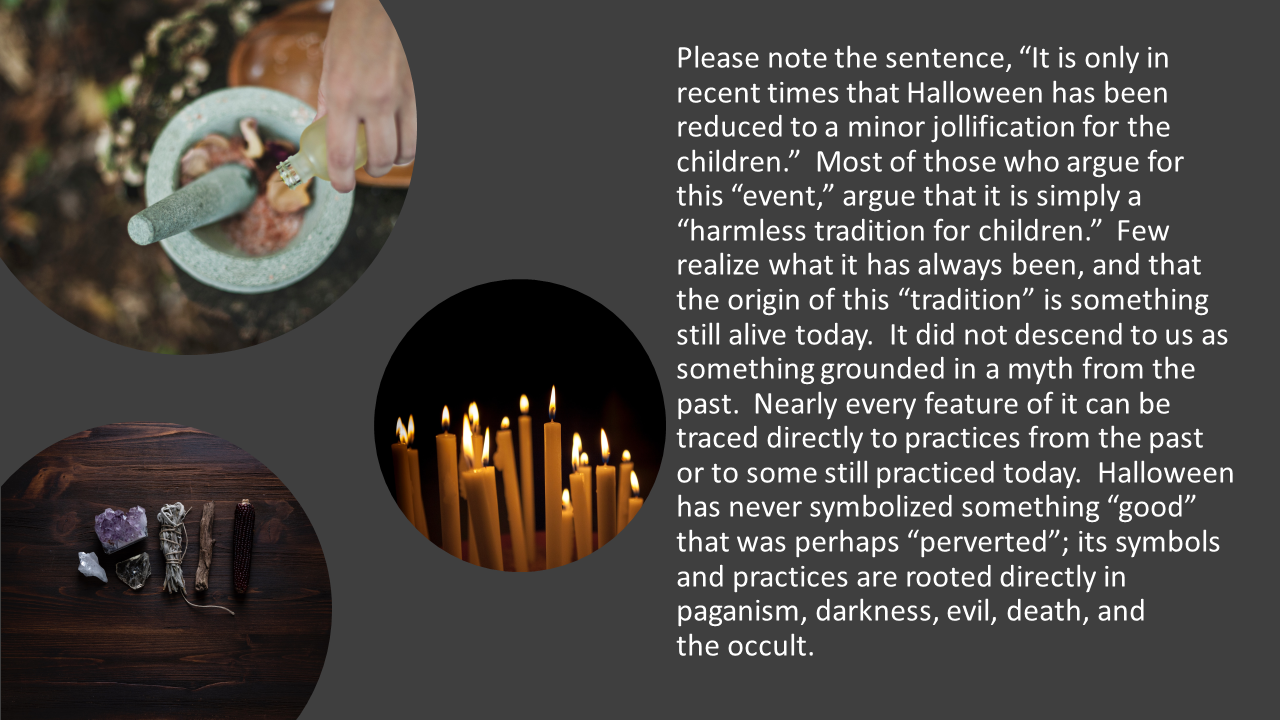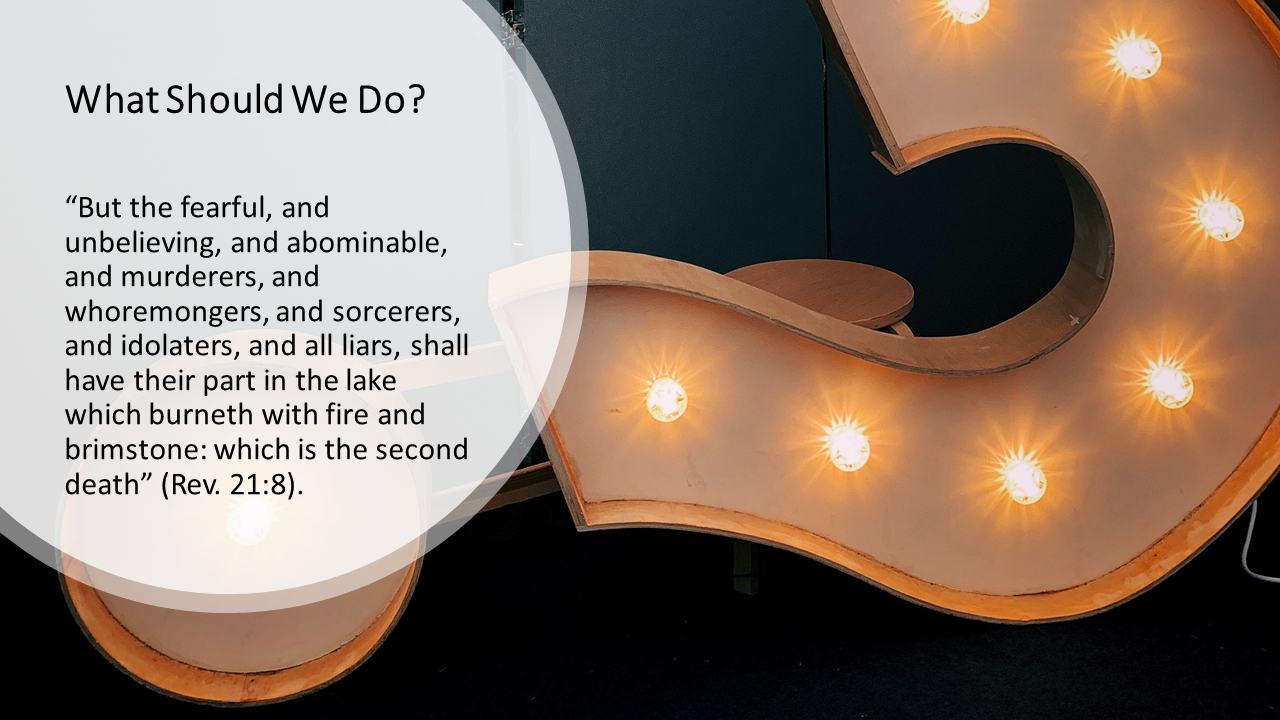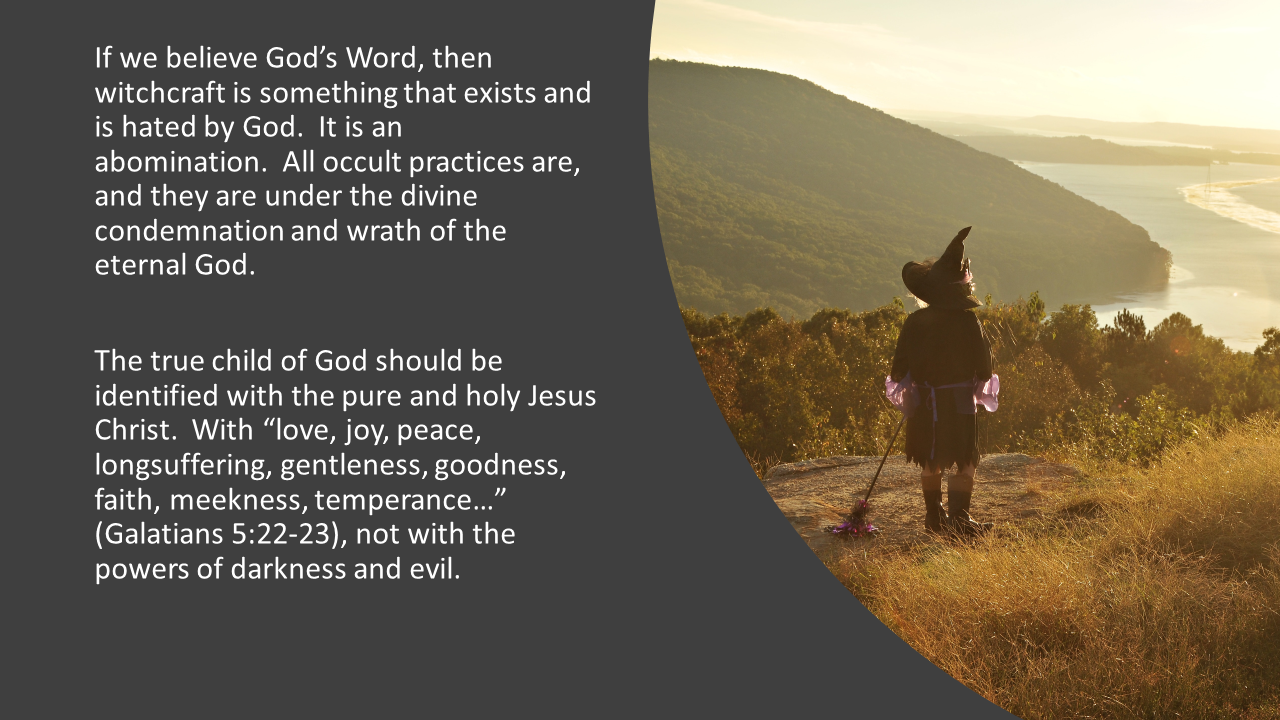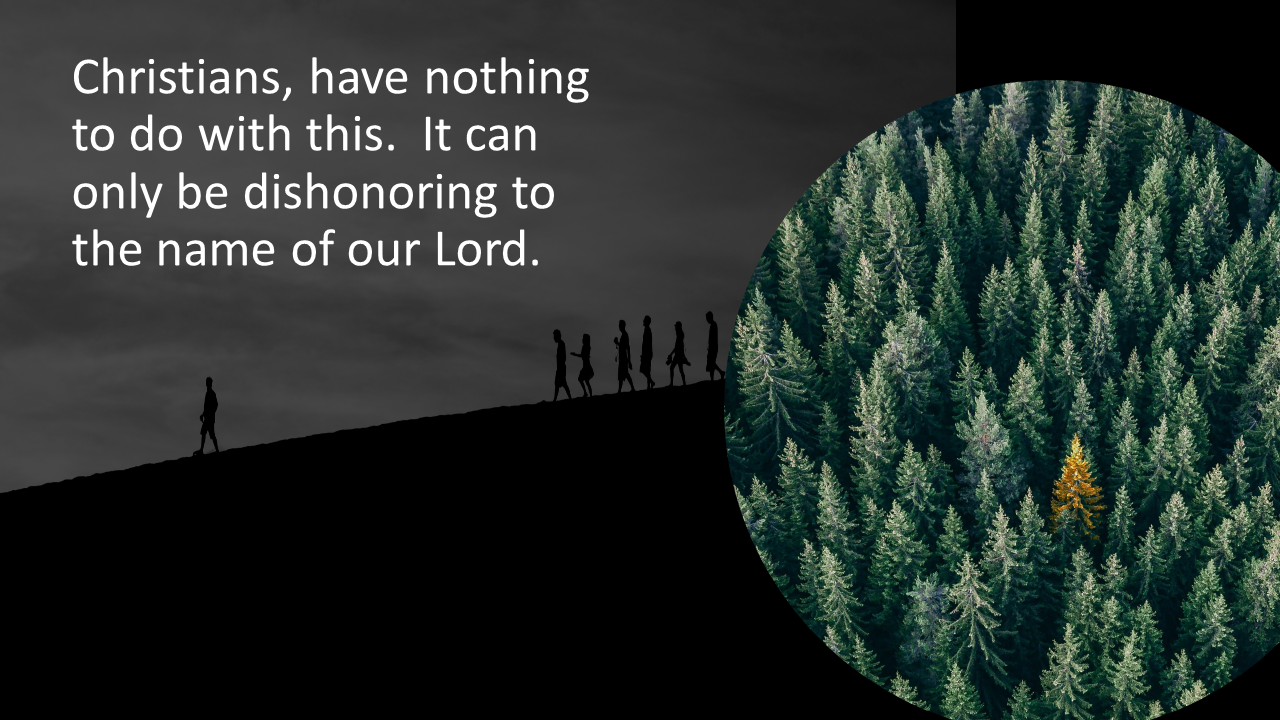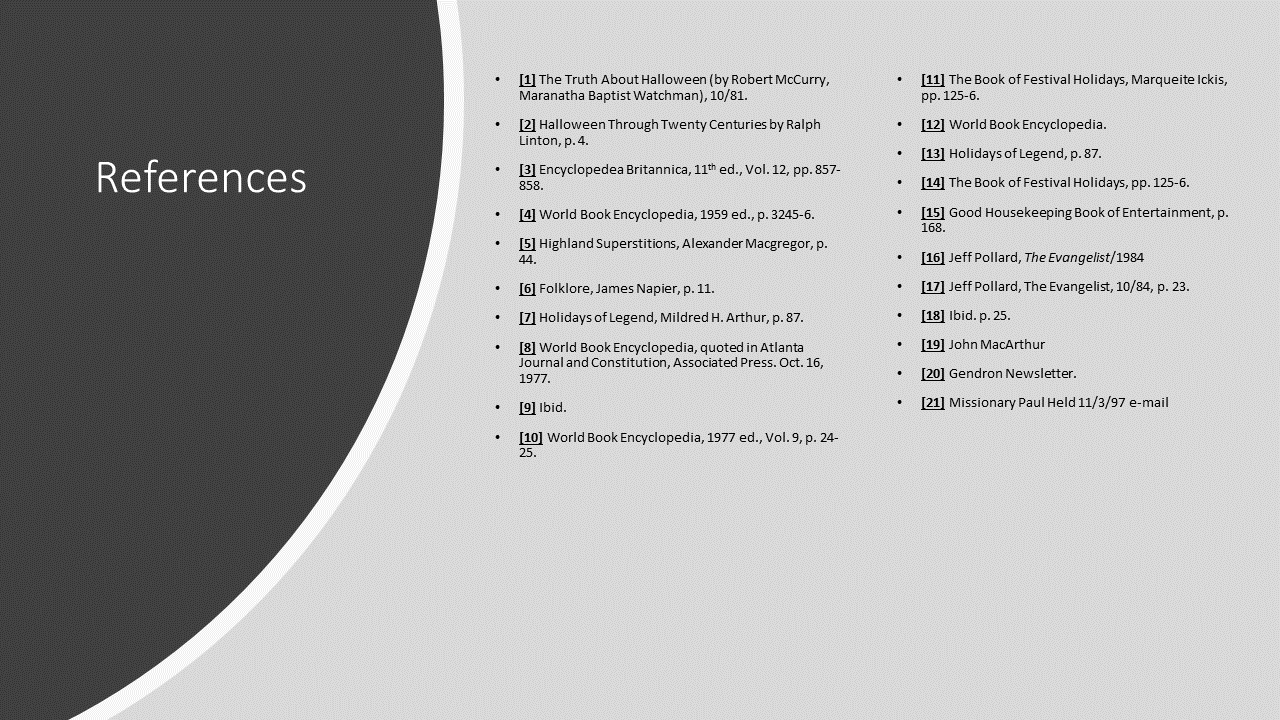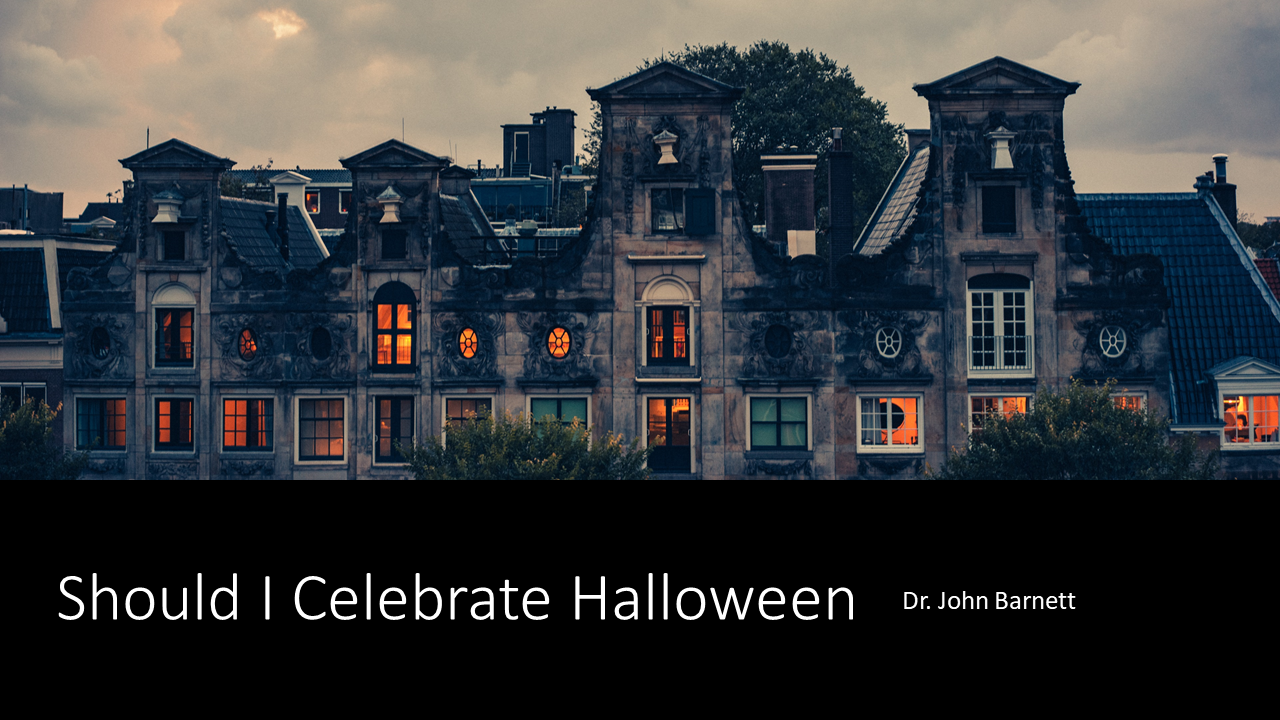Should I Celebrate Halloween
APO-21
NR6-47
991020WE
Should I Celebrate Halloween

“Let everyone who names the Name” Paul said, avoid iniquity. Is Halloween a celebration of iniquity? Read on and judge for yourself!
2 Timothy 2:19 Nevertheless, God’s solid foundation stands firm, sealed with this inscription: “The Lord knows those who are his,” and, “Everyone who confesses the name of the Lord must turn away from wickedness.”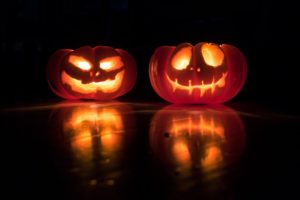
Someone once said, “For a Christian to celebrate Halloween would be as proper as a Holocaust survivor trying to celebrate Hitler’s birthday”. Yet so many believers continue to do so without considering what they are doing. Excited children masquerading as witches, ghosts, goblins, skeletons, demons, and other grotesque characters skipping through the neighborhood knocking one doors changing “trick or treat” while holding out a sack in which one is to drop a piece of candy or other goodies…

The party at school, or church, or Sunday School where they bob for apples, tell fortunes, or go through “haunted houses”…decorations of jack-o-lanterns, witches on brooms and black cats with arched backs…IT’S “HALLOWEEN” – one of the strangest[1] days of the year.
The word evokes a number of responses. Every year as October rolls around, there are those that look forward to it with excitement and those that cringe and wish it weren’t there. Some argue violently against it, some yawn because they’ve heard it all before, may just look the other way and go ahead with it. Some view it as an abomination, while many others view it as a harmless tradition. What is Halloween, or Samhain? What does it represent? And, what should the Christian think about it, if anything?
Where did this fast growing American tradition come from? History provides the answers. Though it was the Roman Catholic church who designated the October 31st date as All Hallow’s Eve, or “eve of the holy one’s day,” in prelude to their November 1st All Saints’ Day, it was earlier pagan peoples who gave the annual holiday the sinister meaning and traditions it still holds.
“The American celebration rests upon Scottish and Irish fold customs which can be traced in direct line from pre-Christian times. Although Halloween has 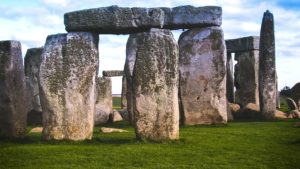 become a night of rollicking fun, superstitious spells, and eerie games which people take only half seriously, its beginning were quite otherwise. The earliest Halloween celebrations were held by the Druids in honor of Samhain, Lord of the dead, whose festival fell on November 1st.”[2]
become a night of rollicking fun, superstitious spells, and eerie games which people take only half seriously, its beginning were quite otherwise. The earliest Halloween celebrations were held by the Druids in honor of Samhain, Lord of the dead, whose festival fell on November 1st.”[2]
“It was a Druidic belief that on the eve of this festival, Saman (Shamhain), Lord of death, called together the wicked souls (spirits) that within the past 12 months had been condemned to inhabit the bodies of animals.”[3]
Many think Halloween is simply a child’s celebration, a night of fun. Those who grew up participating in it probably never thought about it any further than the fun of dressing up and going door to door to fill their bags with treats. The World Book Encyclopedia says much more the same thing when it states, “Halloween is a festival that takes place on October 31st. In the 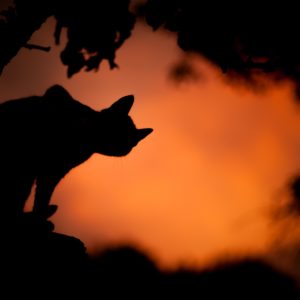 United States, children wear costumes on Halloween and go trick-or-treating. Many carry jack-o-lanterns carved out of pumpkins. At Halloween parties, people enjoy such activities as fortune-telling, hearing stories about ghosts and witches and bobbing for apples.” “The druids, an order of priests in ancient Gaul and Britain, believed that on Halloween, ghosts, spirits, fairies, witches, and elves came out to harm people. They thought the cat was sacred and believed that cats had once been human beings but were changed as a punishment for evil deeds. From these Druidic beliefs cam the present-day use of witches, ghosts, and cats in Halloween festivities.[4]
United States, children wear costumes on Halloween and go trick-or-treating. Many carry jack-o-lanterns carved out of pumpkins. At Halloween parties, people enjoy such activities as fortune-telling, hearing stories about ghosts and witches and bobbing for apples.” “The druids, an order of priests in ancient Gaul and Britain, believed that on Halloween, ghosts, spirits, fairies, witches, and elves came out to harm people. They thought the cat was sacred and believed that cats had once been human beings but were changed as a punishment for evil deeds. From these Druidic beliefs cam the present-day use of witches, ghosts, and cats in Halloween festivities.[4]
“Halloween was the night for the universal walking about of all sorts of spirits, fairies, and ghosts, all of whom had liberty on that night.”[5]
The pagans believed that on one night of the year the souls of the dead returned to their original homes. “There was a prevailing belief among all nations that  at death the souls of good men were taken possession of by good spirits and carried to paradise, but the souls of wicked men were left to wander in the space between the earth and moon, or consigned to the unseen world. These wandering spirits were in the habit of haunting the living…but there were means by which these ghosts might be exorcised.”[6]
at death the souls of good men were taken possession of by good spirits and carried to paradise, but the souls of wicked men were left to wander in the space between the earth and moon, or consigned to the unseen world. These wandering spirits were in the habit of haunting the living…but there were means by which these ghosts might be exorcised.”[6]
To exorcise these ghosts, that is, to free yourself from their supposed evil sway, you would have to set out food – give the demons a 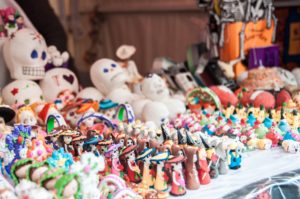 treat – and proved shelter for them during the night. If they were satisfied with your treat, it was believed they would leave you in peace. If food and shelter were not provided, or if they were not satisfied, these spirits, it was believed, would “trick” you by casting an evil spell on you and cause havoc.
treat – and proved shelter for them during the night. If they were satisfied with your treat, it was believed they would leave you in peace. If food and shelter were not provided, or if they were not satisfied, these spirits, it was believed, would “trick” you by casting an evil spell on you and cause havoc.
So Where did each element of Halloween come from?
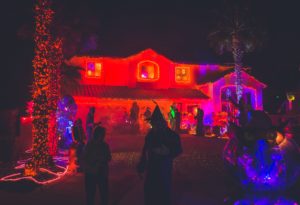
Trick or Treat.
“The modern custom of ‘Trick-or-Treat’ began in Ireland hundreds of years ago. A group of farmers went from house to house begging food for the village Halloween festivities in the name of their ancient gods. Good luck was promised to generous donors, and threats were made against those who would not give.”[7] Thus these ancient pagan traditions continue today as youngsters, masquerading as ghosts, skeletons, and demons go “trick-or-treating” – begging in a sense for food while promising to refrain from evil deeds..
October 31st. 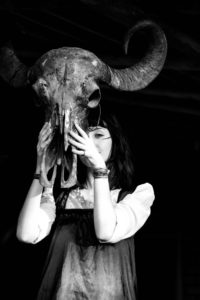
“It was the Celts who set the date of October 31st as their New Year’s Eve and who originally intended it as a celebration of everything wicked, evil and dead. Also, during their celebration they would gather around a community bonfire and offer as sacrifices their animals, their crops, and sometimes themselves. And wearing costumes made from head and parts of other animals, they would also tell one another’s fortunes for the coming year.[8]
“The celebration remained much the same after the Romans conquered the Celts and the Romans conquered the Celts around 43 A.D. The Romans did, however, add a ceremony honoring their goddess of fruit and trees and thus the association with apples and the custom of bobbing for them.”[9]
Jack-O-Lantern. 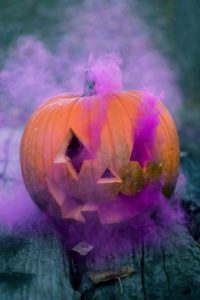
The lighted pumpkin face or “Jack-O-Lantern” is an ancient symbol of a damned soul. “Jack-O-Lanterns were named for a man called Jack, who could not enter heaven or hell. As a result, he was doomed to wonder in darkness with his lantern until Judgment Day.”[10]
“Fearful of spooks…folks began hollowing out turnips and pumpkins and placing lighted candles inside to scare evil spirits from the house.”[11]
Halloween Christianized.
Since Halloween is unmistakably pagan in its origin and practice, how did the professing church come to accept and keep such a day?
Again history provides the answer. Ever since the time of Constantine, who made Catholicism the state religion, the Roman emperors realized how essential it was to have a unified empire, where as many as possible would be of one mind. The civil and religious leaders saw how important it was for the sake of unity to allow only one religion with in the Roman domain.
A stringent state policy was implemented to force all non-Christians to accept the state religion. The condition for “conversion,” of course made it easy for 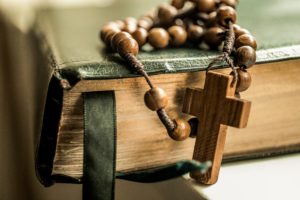 the pagan population of Rome and elsewhere to “accept” ‘Christianity.’ Since “acceptance” of ‘Christianity’ was made simple, refusal was made difficult. This plan resulted in large numbers of the heathen population within the empire to flock to the membership of the church. These people brought with them many pagan practices and celebrations, Halloween merely being one of them.
the pagan population of Rome and elsewhere to “accept” ‘Christianity.’ Since “acceptance” of ‘Christianity’ was made simple, refusal was made difficult. This plan resulted in large numbers of the heathen population within the empire to flock to the membership of the church. These people brought with them many pagan practices and celebrations, Halloween merely being one of them.
How could the church deal with this problem? The church realized that to excommunicate these pagans would only reduce the membership of the church. This they were unwilling to do. The church had also learned in past times that it was not possible to force the people into discarding all their heathen practices and adopting Roman ones.
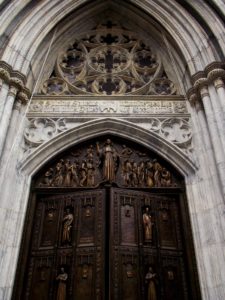 There remained only one other way. It was reasoned that if a pagan practice or festival could not be forbidden, let it be “Christianized.” Let the recently converted pagans keep certain of their heathen festivals, such as Halloween or All Saint’s Day – but label it “Christian.” Of course they were asked not to pray to their ancient pagan gods on this day. They would now use this day to commemorate the death of “saints.”
There remained only one other way. It was reasoned that if a pagan practice or festival could not be forbidden, let it be “Christianized.” Let the recently converted pagans keep certain of their heathen festivals, such as Halloween or All Saint’s Day – but label it “Christian.” Of course they were asked not to pray to their ancient pagan gods on this day. They would now use this day to commemorate the death of “saints.”
“In the A.D. 800’s the (Catholic) church established All Saints Day on November 1st so that people could continue a festival they had celebrated before becoming Christians. The mass that was said on this day was called ALLHALLOWMAS. The evening before became know as All Hallow e’en or Halloween…It means hallowed or holy evening.”[12]
“The celebration of Halloween is a survival of ancient pagan beliefs. When the early (Catholic) church was unable to stop pagan practices, it accepted them and gave them a religious tune.”[13]
What is Halloween Today
Most of the ancient symbols and traditions of Halloween still exist today. Youngsters still dress in costume and go trick-or-treating: begging in a sense, for food while promising to refrain from evil deeds. And, too, they still light their candles, although much smaller than a torch, and place them inside their pumpkins.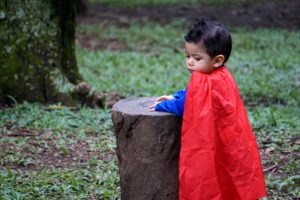
“It is the one night of they ear in which a child experiences the emotion of fear, fantasy and mystery.”[14]
In advising on what to do on Halloween, THE GOOD HOUSEKEEPING BOOK ON ENTERTAINMENT says: “Orange, black and red, the devil’s colors associated with Halloween and this scheme should be carried out as far as possible…Have paper streamers and lanterns hanging from the ceiling, or if you would like to have something less usual, you could make a giant spider web with black and orange strings, or in narrow strips of crepe paper coming from the four corners of the room, complete with a large spider-one of the devil’s followers.”[15]
Is there an Inconsistency among Professing Christians?
Bible-believing Christians cringe and shutter at the thought of Satan worship and occult rites. But how many of these same people will dress their children as witches, ghosts, skeletons, or devils and send them out to “trick-or treat”? How many smile approvingly at the church or Sunday School and youth organizations that have Halloween parties and sponsor “haunted house” activities?
Can any Christian give any scriptural-or even logical reason for participation in, or approval of that which is unmistakably associated with paganism, devil-worship, witchcraft and Romanism?
Are God’s People Governed by the Scriptures?
The 18th chapter of the book of Deuteronomy, (v. 10-13) very explicitly forbids Christians to have anything to do with witchcraft (Lev. 19:31), spiritism, or the demonic. In verse 10 of that Chapter we read: “ There shall not be found among you anyone that maketh his son or his daughter to pass through the fire (this  has reference to the worship of the pagan God Moloch which was state worship), or that useth divination (a false and pagan counterpart of prophecy; the art or act of foretelling secret knowledge, especially of the future, or an observer of times (astrology), or an enchanter, (to cast under a spell; charm; enrapture; to chant (magic words), or a witch (divinations in connection with the worship of idolatrous and demoniacal power), or a charmer (a fabricator of material charms or amulets to be worn especially around the neck, as a charm against evil or injury), or a consulter with evil spirits (an inquirer by a familiar spirit), or a wizard (a false prophet, especially a conjurer. One who summons a devil by oath, incantation or magic spell), or a necromancer (one who in one form or another seeks to find information by consulting the dead).
has reference to the worship of the pagan God Moloch which was state worship), or that useth divination (a false and pagan counterpart of prophecy; the art or act of foretelling secret knowledge, especially of the future, or an observer of times (astrology), or an enchanter, (to cast under a spell; charm; enrapture; to chant (magic words), or a witch (divinations in connection with the worship of idolatrous and demoniacal power), or a charmer (a fabricator of material charms or amulets to be worn especially around the neck, as a charm against evil or injury), or a consulter with evil spirits (an inquirer by a familiar spirit), or a wizard (a false prophet, especially a conjurer. One who summons a devil by oath, incantation or magic spell), or a necromancer (one who in one form or another seeks to find information by consulting the dead).
 “Thou shalt not learn to do after their abominations…” (Deut. 18:9). “Regard not them that have familiar spirits, neither seek after wizards to be defiled by them: I am the Lord your God” (Lev. 19:31).
“Thou shalt not learn to do after their abominations…” (Deut. 18:9). “Regard not them that have familiar spirits, neither seek after wizards to be defiled by them: I am the Lord your God” (Lev. 19:31).
It is obvious that the elements, symbols, and traditions of the Halloween observance with its emphasis upon goblins and demons, witches and skeletons, ghosts and apparitions rising from cemeteries constitute a dabbling with the very things, which Scripture forbids to God’s people and an open invitation to demonic activity.
It is at this point that many will say, “But we don’t worship demons on Halloween. It doesn’t mean the same thing today as it did in the past. It’s now just a harmless, innocent time of fun for the children and the young people.”
Yet, history clearly shows that Halloween is unmistakably a “religious” (pagan and Roman) holiday. Religion is the adoration, obedience, and service rendered to the object of one’s worship. It presupposes profession, practice, or observance of whatever belief and practice – in this case Halloween – as required by some superior authority. It is indisputably clear that Halloween is NOT commanded or sanctioned by Jehovah God – the true Christian’s Superior, Authority – in the Scriptures.
“Abstain form all appearances of evil” (1 Thess. 5:22). “And many that believed came and confessed, and shewed their deeds. Many of them also which used curious arts brought their books together, and burned them before men” (Acts 19:18-19). “Whether therefore ye eat, or drink, or whatever ye do, do all to the glory of God” (1 Cor. 10:31).
Does Halloween support witchcraft[16]: Whose Celebration Is It???
“Witches have eight major festivals throughout the year. Four are the solar festivals: one at both equinoxes, and one at both solstices. The other four occur almost mid-point between the solar festivals; the most famous of these are Samhain (Halloween to non-witches) and Beltane (May Day). Samhain, or Halloween, is the beginning of our new year, and is the time when we can most effectively communicate with the dead[17].”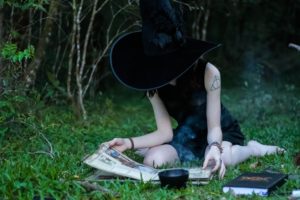
A little history is in order. The Dictionary of the Occult and Paranormal states simply, “Originally a pagan festival of darkness, fire, and death, All Hallows’ Eve was celebrated by the Celts of Northern Europe…Halloween was also an important date for the witches calendar.”
Pagan…darkness…death…an important date for the witch’s calendar. These words are clear and graphic, but let’s search for a little more detail.
The encyclopedia, Man, Myth, and Magic, puts it this way, “All Hallows’ Eve, or Halloween, was originally a festival of fire, the dead, and the powers of darkness. It’s the evening of October 31st, the night before the Christian festival of All Hallows’ Day. All Hallows’ Day commemorates the saints and martyrs, and was first introduced in the seventh century. Its date was changed from May 13th to November 1st in the following century, probably to make it coincide with and Christianize a pagan festival of the dead. All Souls Day in the Roman Catholic calendar is November 2nd. Prayers for the souls of the dead mark it. It is only in recent times that Halloween has been reduced to minor jollification for the children.”
“Before the coming of Christianity, the pagan Celts in Northern Europe held two great fire festivals each year – Beltane on the eve of May 1st and Samhain on the eve of November 1st – to mark the beginning of summer and winter.”
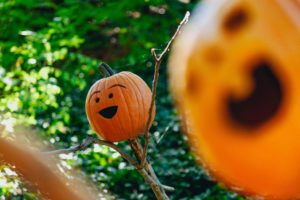 Please note the sentence, “It is only in recent times that Halloween has been reduced to a minor jollification for the children.” Most of those who argue for this “event,” argue that it is simply a “harmless tradition for children.” Few realize what it has always been, and that the origin of this “tradition” is something still alive today. It did not descend to us as something grounded in a myth from the past. Nearly every feature of it can be traced directly to practices from the past or to some still practiced today. Halloween has never symbolized something “good” that was perhaps “perverted”; its symbols and practices are rooted directly in paganism, darkness, evil, death, and the occult.
Please note the sentence, “It is only in recent times that Halloween has been reduced to a minor jollification for the children.” Most of those who argue for this “event,” argue that it is simply a “harmless tradition for children.” Few realize what it has always been, and that the origin of this “tradition” is something still alive today. It did not descend to us as something grounded in a myth from the past. Nearly every feature of it can be traced directly to practices from the past or to some still practiced today. Halloween has never symbolized something “good” that was perhaps “perverted”; its symbols and practices are rooted directly in paganism, darkness, evil, death, and the occult.
What Halloween Represents:
The Druids[18] were pagan priests of an old Celtic religion. Druids are mentioned by name in thirty references in Greek and Roman writers between the second century B.C. and the fourth century A.D. They were a barbaric order, dreaded or their power and bloodthirstiness. They certainly appear as lawgivers, and as being extremely concerned with animal and human sacrifices.
They were, of course, the sole interpreters of religion…they determined all disputes by a final and unalterable decision, and had the power of inflicting the punishment of death. And, indeed, their altars streamed with the blood of human victims. Holocausts of men, women, and children, enclosed in large sacks of wickerwork, were sometimes sacrificed as burnt offerings to their superstition, which were, at the same time, intended to enhance the consideration of the priests, who were an ambitious race delighting in blood.
It has been held by some that the Druids were the builders of England’s Stonehenge. In fact, “…it is still commonly thought that the Druids built the place as a sun-worshipping temple and site for human sacrifice. Many eighteenth and nineteenth century authors continue to accept this explanation.”
 However, archeological evidence seems to make clear that the structure had existed over 1,000 years before the Druids. It is apparent that they used this site for their ceremonies but normally preferred forest groves. There appears to be evidence that they used the giant stone carvings to determine the best day to appease the God or gods of their mystery practices. That day was October 31st. Samhain (The Lord of the Dead) is said to have called up the evil spirits of those that had died during the previous year. The inhabitants of the local countryside would cringe in fear as these demonic rituals took place. Irene Park, a former witch, presents her version of what followed:
However, archeological evidence seems to make clear that the structure had existed over 1,000 years before the Druids. It is apparent that they used this site for their ceremonies but normally preferred forest groves. There appears to be evidence that they used the giant stone carvings to determine the best day to appease the God or gods of their mystery practices. That day was October 31st. Samhain (The Lord of the Dead) is said to have called up the evil spirits of those that had died during the previous year. The inhabitants of the local countryside would cringe in fear as these demonic rituals took place. Irene Park, a former witch, presents her version of what followed:
“…The Druids in Ireland would go through the neighborhoods and countryside on the eve of October 31st to collect offerings for Satan. They would carry lanterns, bags for money, and canes with very sharp points on the ends (currently known as leprechaun staffs, good luck horns, or fairies’ wands). At each house, they would demand a specified amount. If the household would not or could not give the offering (penance or treat), the Druid would use his cane to castrate the male human or one of their prize animals.”
Another version of the proceedings of the evening is that as the spirits of the dead were released, they sought their old dwelling places and stalked the countryside’s. Offerings of food and drink were put outside to protect the homes and possessions of the family. Bonfires were lit to keep the ghosts and demons away. It was from these beginnings that what is celebrated today originated. There are many other versions and customs: some are fact, some are fantasy, and these vary from country to country. Against this backdrop we can see where our “celebration” began. Please note in the following quotations a similarity in each: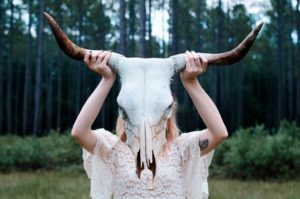
“The guisers went from house to house, singing and dancing. Their bloodcurdling masks and grotesque costumes may have been meant to keep evil at bay, or more likely, were a visible representation of the ghosts and goblins that lurked in the night. These masks have now been transferred to the children who, in the United States, visit neighbors for the food offering which once belonged to the dead – or play tricks akin to the legendary destructiveness of witches and imps abroad on the night.”
“It is interesting to note that much of the original folklore of Halloween has been preserved in the modern traditions: the goblins, jack-o-lanterns, children’s parties, begging for gifts, et cetera, which all had their origin in the ancient celebration of All Hallows’ Eve.”
Perhaps an illustration would clarify the point. Should we dress up our children for church with swastika earrings? Why not dress them up in little nazi uniforms and let them have a new celebration where they go from door to door looking for Jews in hiding? That would be the height of offensiveness. It would be awful, repulsive, and unthinkable. Why? Because we know that the terrible treatment of the Jews in World War II was a frightening reality and that the holocaust was an indescribable evil. Surely no one in his right mind would conceive of such a tasteless and disgusting thing as dressing children up with symbols that represent evil. Why, then, do some still persist in dressing little ones up as representations of what God condemns?
 Witches, wizards, black cats, jack-o-lanterns – are all visible reminders of that which is abominable to God. The practices of the Druids, their horrible sacrificing of people, the witches, the occultists, and all of their trappings were and are an unholy thing still being practiced in various parts of the world. The true believer in the Lord Jesus Christ should be as far removed from this “tradition” as possible.
Witches, wizards, black cats, jack-o-lanterns – are all visible reminders of that which is abominable to God. The practices of the Druids, their horrible sacrificing of people, the witches, the occultists, and all of their trappings were and are an unholy thing still being practiced in various parts of the world. The true believer in the Lord Jesus Christ should be as far removed from this “tradition” as possible.
Summing It Up: What Should We Do?

Sadly enough, the biggest opposition to what has been said invariably comes from within professing Christendom. The witches, the occultists, and the secular sources all freely call it like it is. Note the following quotation from a contemporary witch. “Most of Christianity’s holy days have their basis in pagan ritual. I get myself into a lot of hot water when I remind American Christians of that fact. No matter, it’s true. But the level of tolerance is rising.”
“But the fearful, and unbelieving, and abominable, and murderers, and whoremongers, and sorcerers, and idolaters, and all liars, shall have their part in the lake which burneth with fire and brimstone: which is the second death” (Rev. 21:8).
If we believe God’s Word, then witchcraft is something that exists and is hated by God. It is an abomination. All occult practices are, and they are under the divine condemnation and wrath of the eternal God. Should the redeemed of God, His children, have anything to do with that which represents Satan? Should children who “are an heritage of the Lord” (Psalm 127:3) be dressed up like witches and ghosts and goblins in light of God’s displeasure? 1 Thessalonians 5:22 says, “Abstain from all appearance of evil.” The Amplified Bible puts it this way, “Abstain from evil – shrink from it and keep aloof from it – in whatever form or whatever kind it may be.”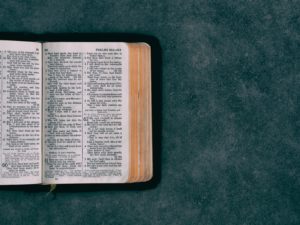
The true child of God should be identified with the pure and holy Jesus Christ. With “love, joy, peace, longsuffering, gentleness, goodness, faith, meekness, temperance…” (Galatians 5:22-23), not with the powers of darkness and evil. The witch, earlier in this article, clearly states that it’s their holiday, their celebration. History bears that out. Christians, have nothing to do with this. It can only be dishonoring to the name of our Lord.
Q: “What is your perspective[19] of Halloween?
A: There are a number of reasons why I think it is unwise for Christian parents to permit their children to go door-to-door collecting candy on Halloween. First of all, dressing up like witches, ghosts, or goblins is incompatible with a Christian’s testimony.
Furthermore, many of the customs of Halloween are associated with the worst kinds of pagan beliefs and ceremonies; they are usually centered on sinister things such as demons, witchcraft, and superstition.
If we as Christian parents simply disregard the unchristian aspects of such practices as mere fantasy or superstition and then encourage our children to participate in them, we run the risk of communicating the message that the spiritual battle waged by the rulers of darkness (Ephesians 6:10) is not to be taken seriously.
Halloween has its origins in an ancient Celtic harvest celebration. The superstitious Celts believed that demons, ghosts, and hobgoblins roamed free in the dark and barren days of winter, and the end of October was the onset of that season. Their celebrations grew out of their superstitions, and they have been passed down to the present day, along with other pagan and satanic beliefs.
Another reason I don’t advise parents to permit their children to celebrate Halloween by dressing up and going door to door is the issue of safety. The possibility of a child being struck by an automobile, kidnapped, poisoned, or otherwise injured is greater than on any other night of the year.
 Still, I think it is wise for parents to give their children a creative alternative to celebrating Halloween. They shouldn’t feel like they’ve missed something because they are Christians.
Still, I think it is wise for parents to give their children a creative alternative to celebrating Halloween. They shouldn’t feel like they’ve missed something because they are Christians.
Our family likes to spend Halloween together. We plan special activities that are more fun for the kids than begging candy. In the past, we have all gone out together for ice cream, or we might stay home and have a special evening together doing something just for them.
That way when the children face the inevitable pressure of talking with their friends about what they did on Halloween, they can share their faith in positive terms, rather than having to speak of what they can’t do because of their parents’ Christian faith.
HALLOWEEN: WHO ARE WE TO BE LIKE AS CHRISTIANS?
Romans 8:29 For whom he did foreknow, he also did predestinate [to be] conformed to the image of his Son, that he might be the firstborn among many brethren. (KJV)
I Peter 1:14-16 As obedient children, not fashioning yourselves according to the former lusts in your ignorance: 15 But as he which hath called you is holy, so be ye holy in all manner of conversation; 16 Because it is written, Be ye holy, for I am holy. (KJV)
WHAT SPIRIT IS OUR GUIDE?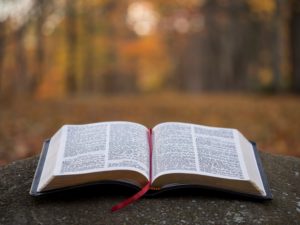
2 Corinthians 6:16-7:1 And what agreement hath the temple of God with idols? For ye are the temple of the living God; as God hath said, I will dwell in them, and walk in [them]; and I will be their God, and they shall be my people. 17 Wherefore come out from among them, and be ye separate, saith the Lord, and touch not the unclean [thing]; and I will receive you. 18 And will be a Father unto you, and ye shall be my sons and daughters, saith the Lord Almighty.
7:1 Having therefore these promises, dearly beloved, let us cleanse ourselves from all filthiness of the flesh and spirit, perfecting holiness in the fear of God. (KJV)
WHAT ARE WE TO AVOID ANY CONTACT WITH?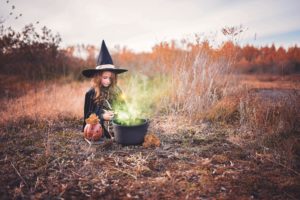
Deuteronomy 18:9-12 When thou art come into the land which the LORD thy God giveth thee, thou shalt not learn to do after the abominations of those nations. 10 There shall not be found among you (any one) that maketh his son or his daughter to pass through the fire [or] that useth divination, [or] an observer of times, or an enchanter, or a witch, 11 Or a charmer, or a consulter with familiar spirits, or a wizard, or a necromancer, 12 For all that do these things [are] an abomination unto the LORD thy God doth drive them out from before thee. (KJV)
Should we Beware of Halloween?
There are some Christians[20] who believe Halloween activities are harmless and innocent fun for their children. What they may not know is its roots are firmly planted in paganism and occultism. In ancient Britain and Ireland, the Celtic festival of Samhain (the Lord of the Dead) was observed on Oct. 31. Huge bonfires were set to attract evil spirits and keep them away from homes. The souls of the dead were said to revisit their homes along with all kinds of demons, witches, and sinister characters. The Druids at Stonehenge in England performed mass human sacrifices. The Celts believed that by watching the victims die in the fire, they would be able to see signs of the future.
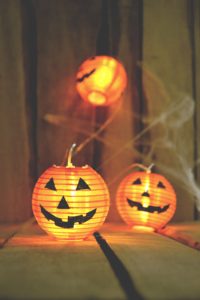 The ancient symbol of the jack-o-lantern actually represents a damned soul. It was named after a notorious man named Jack, who supposedly tricked the devil after making a binding contract with him.
The ancient symbol of the jack-o-lantern actually represents a damned soul. It was named after a notorious man named Jack, who supposedly tricked the devil after making a binding contract with him.
How did the Roman Catholic Church come to accept such a day so rooted in paganism? It comes on the eve of The Catholic Church’s All Saint’s Day (Nov. 1), a day Rome established as a counter holiday to Halloween. As the Catholic Church absorbed the Celts into the Church, they were allowed to bring in all their pagan customs and traditions.
Today Halloween is the highest of all celebrations for Satan worshippers, witches and the occult. Christians need to be warned so they can take heed and obey the Word of God. The apostle Paul wrote, “Take no part in the unfruitful works of darkness, but instead expose them” (Eph. 5:11). “Abstain from all appearances of evil” (1 Thes. 5:22). “Whatever you do, do all to the glory of God” (1 Corinthians 10:31).
Halloween
On All Saints Day, it is a Hungarian[21] custom (as in many countries) to go the cemetery and place candles and flowers on the grave of a loved one. Many village and city cemeteries are lit up with candles in the night and can be seen from a mile away. The city cemetery is no exception, and five us distributed  tracts to people coming and going to the cemetery. To see the sad, hopeless faces that people have and to know the only true hope that Christ gives is a continual motivation to share the gospel.
tracts to people coming and going to the cemetery. To see the sad, hopeless faces that people have and to know the only true hope that Christ gives is a continual motivation to share the gospel.
Several thousand people took tracts (only about 3 in a 100 would refuse). Many people whose hands were so full with pine tree wreaths and flowers would ask us to put the tract in their pocket, or even in their purse. There is still a great degree of trust and openness to receive literature in this town, on key occasions.
[1] The Truth About Halloween (by Robert McCurry, Maranatha Baptist Watchman), 10/81.
[2] Halloween Through Twenty Centuries by Ralph Linton, p. 4.
[3] Encyclopedea Britannica, 11th ed., Vol. 12, pp. 857-858.
[4] World Book Encyclopedia, 1959 ed., p. 3245-6.
[5] Highland Superstitions, Alexander Macgregor, p. 44.
[6] Folklore, James Napier, p. 11.
[7] Holidays of Legend, Mildred H. Arthur, p. 87.
[8] World Book Encyclopedia, quoted in Atlanta Journal and Constitution, Associated Press. Oct. 16, 1977.
[9] Ibid.
[10] World Book Encyclopedia, 1977 ed., Vol. 9, p. 24-25.
[11] The Book of Festival Holidays, Marqueite Ickis, pp. 125-6.
[12] World Book Encyclopedia.
[13] Holidays of Legend, p. 87.
[14] The Book of Festival Holidays, pp. 125-6.
[15] Good Housekeeping Book of Entertainment, p. 168.
[16] Jeff Pollard, The Evangelist/1984
[17] Jeff Pollard, The Evangelist, 10/84, p. 23.
[18] Ibid. p. 25.
[19] John MacArthur
[20] Gendron Newsletter.
[21] Missionary Paul Held 11/3/97 e-mail
Slides
Check Out All The Sermons In The Series
You can find all the sermons and short clips from this series, Apologetics – Church History here
Looking To Study The Bible Like Dr. Barnett?
Dr. Barnett has curated an Amazon page with a large collection of resources he uses in his study of God’s Word. You can check it out here.

